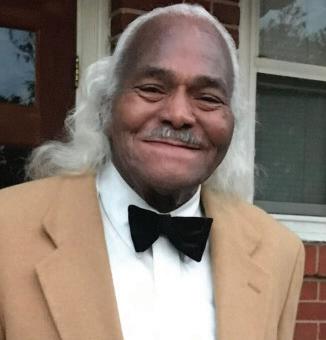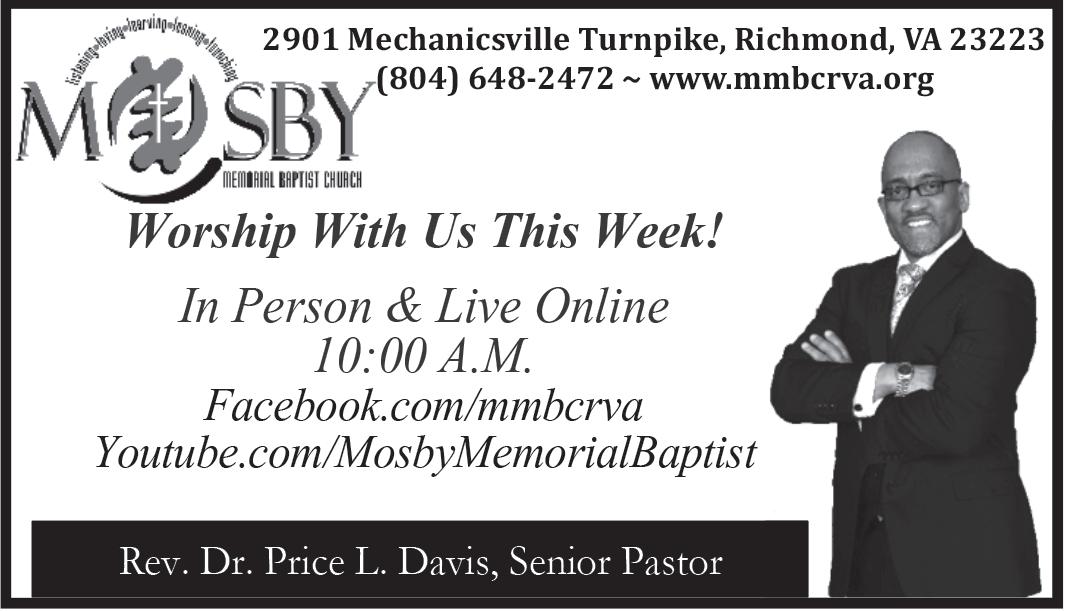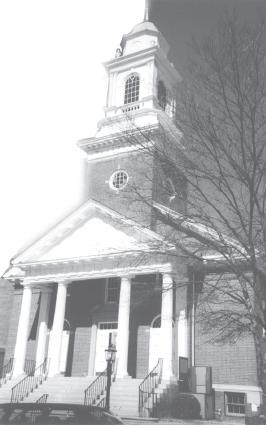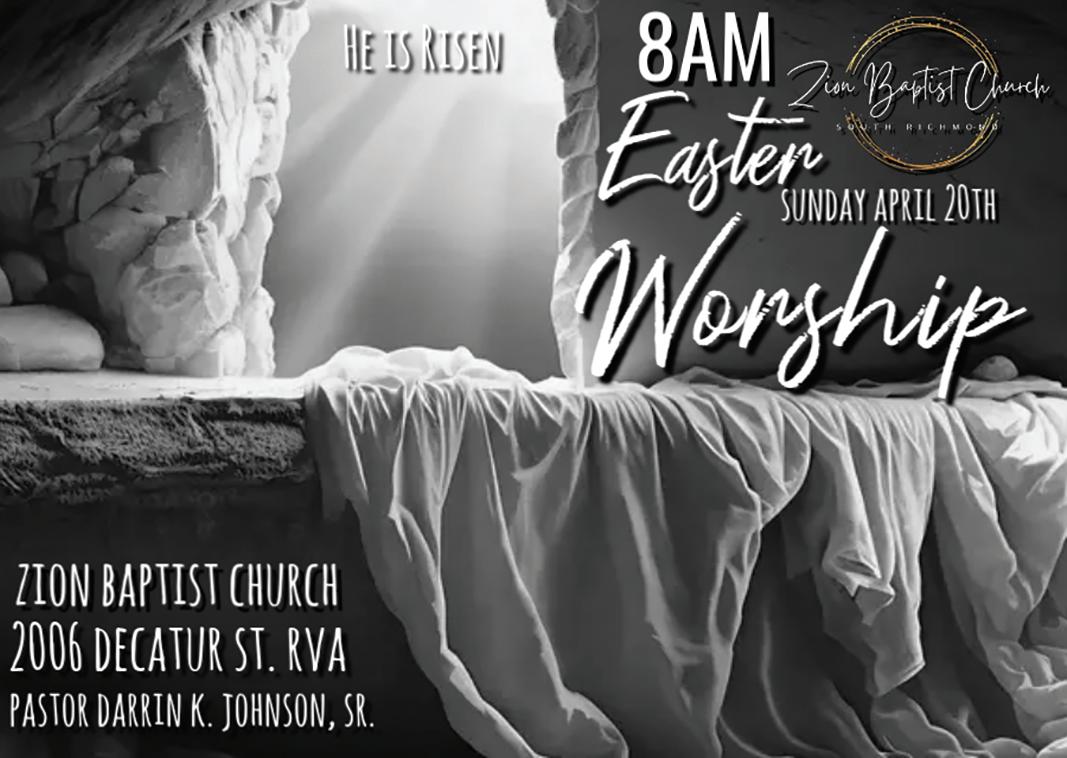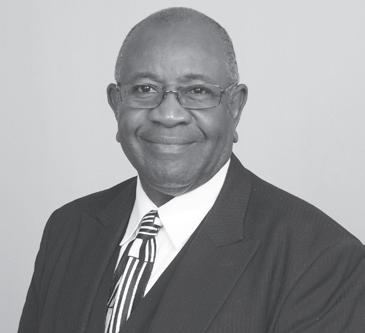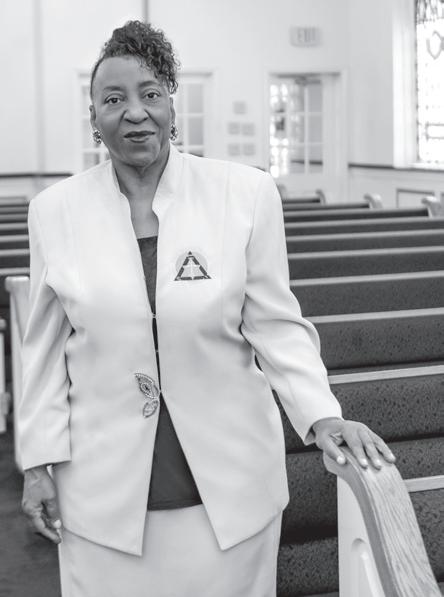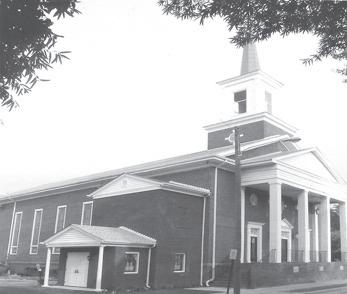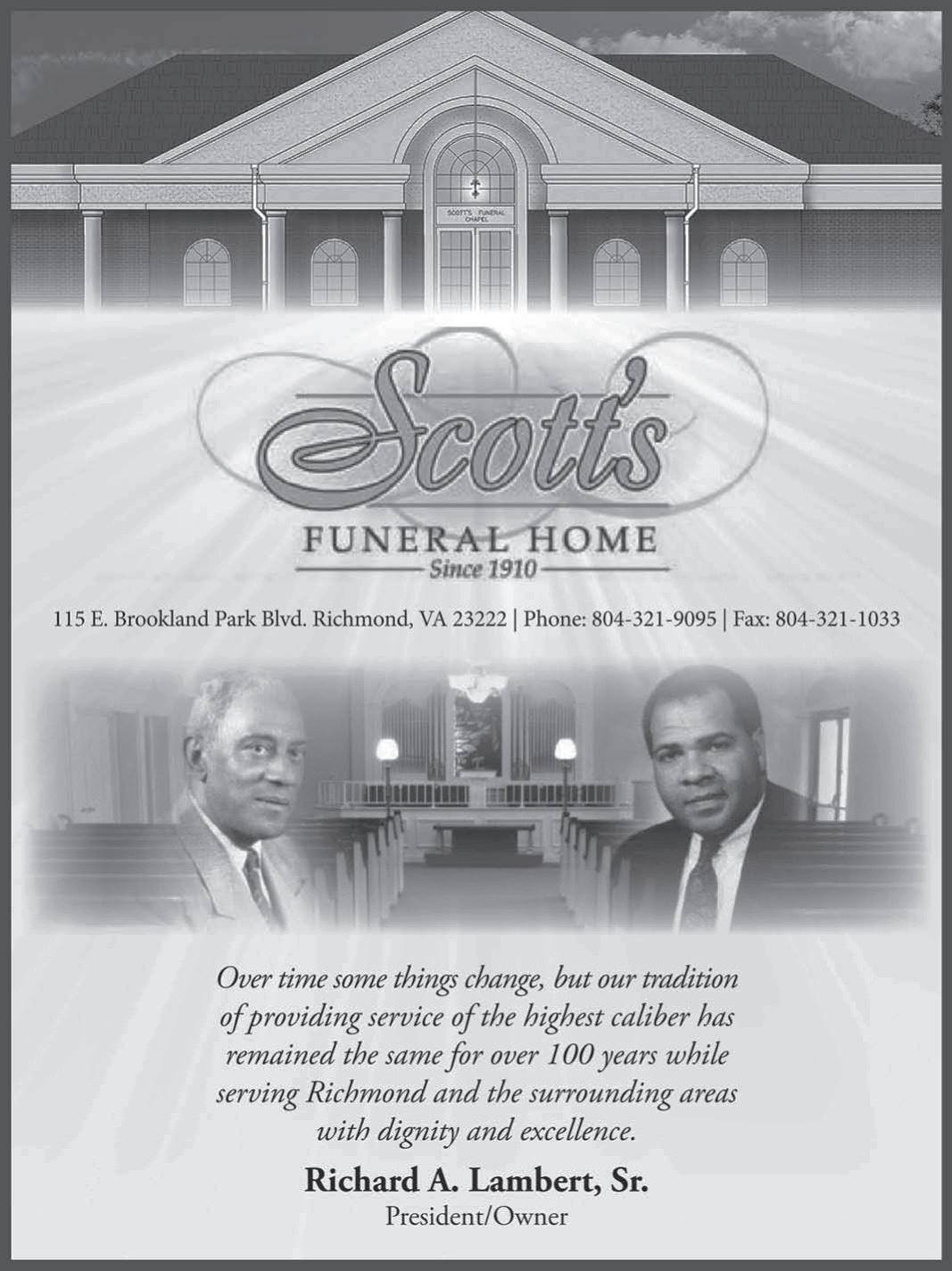




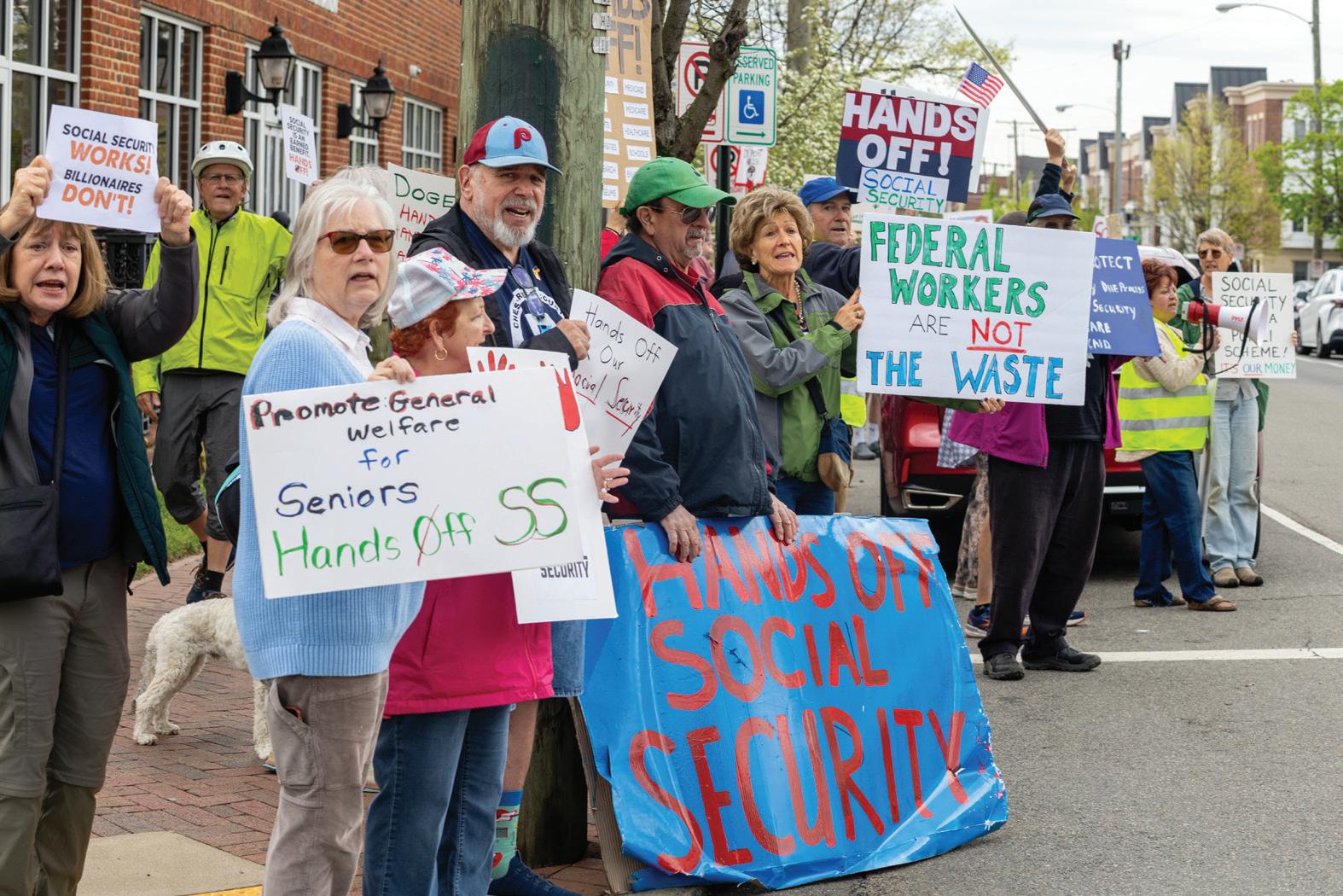
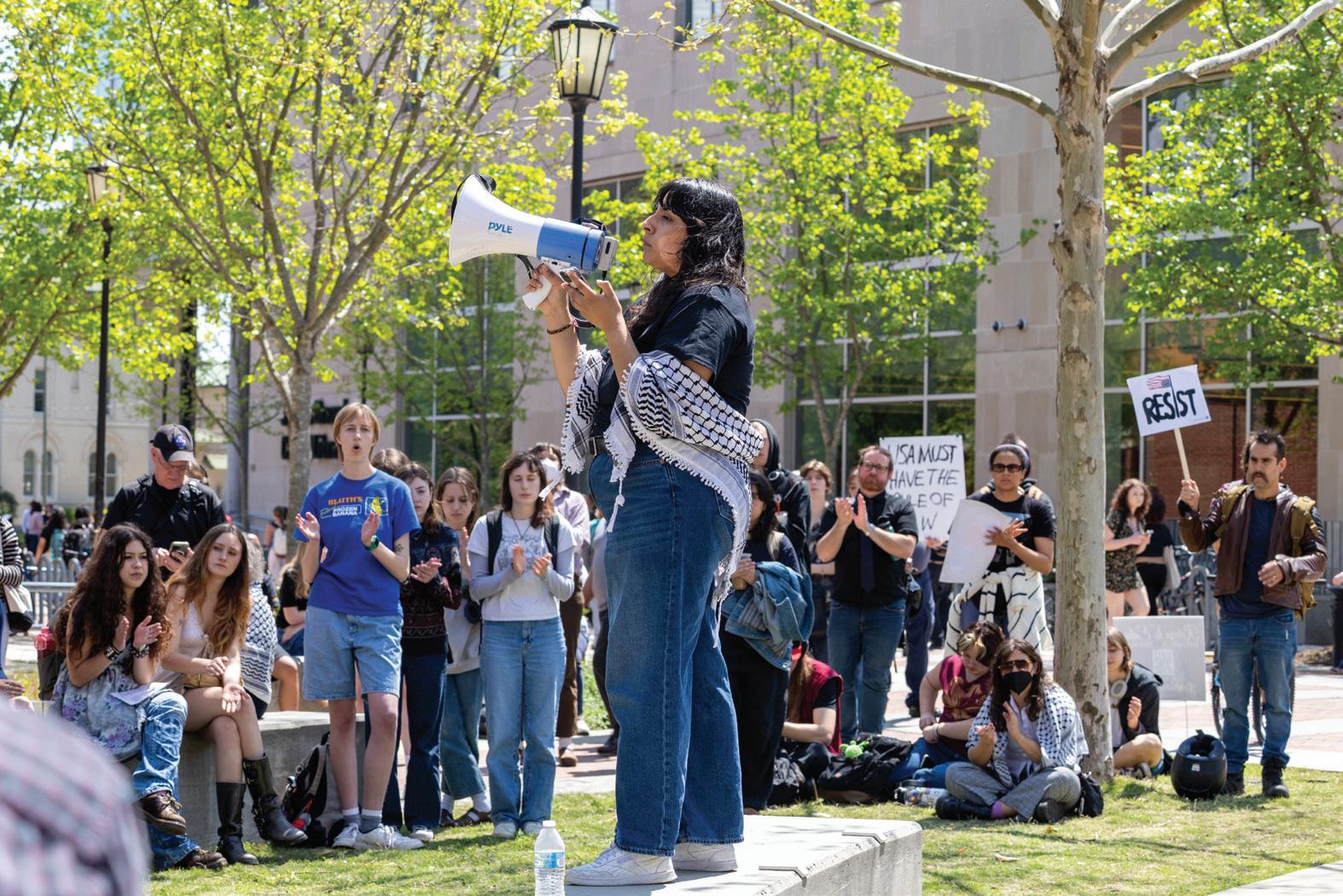
By
By George Copeland Jr.
Richmond’s proposed $3 billion budget for 2026 drew scrutiny this week, as City Council members and residents attended a series of meetings to push for changes and raise concerns.
Monday evening’s council meeting saw residents pack the City Council Chamber to comment on the budget proposed by Mayor Danny Avula.
“We deserve a chance to thrive, not just survive,” said Kyrie Fields, an armed security officer at the Broad Rock and Hull Street libraries, as he addressed council members.
International Union, Richmonders Involved to Strengthen Our Communities (RISC), and local educators spoke out during nearly two hours of public comment.
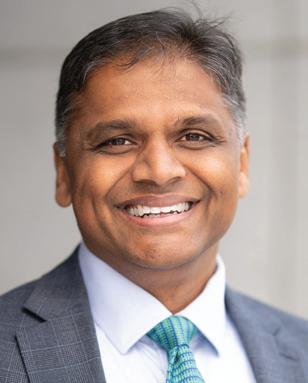
Fields’ plea called for extending the $20 hourly minimum wage for City employees to include contract workers, a sentiment echoed by more than 50 other attendees who raised similar concerns.
Contract workers and allies from the local chapter of the Virginia Service Employees
Requests included fully funding Richmond Public Schools, supporting the mobile home repair program and Affordable Housing Trust Fund, and restoring funding to the Office of Community Wealth Building and other services.
“No member of our community should be considered voiceless or invisible,” RISC Co-President Marvin Gilliam said. “Long-term solutions are necessary and our neighbors are currently living in need and need our help today.”
The large turnout occurred between budget work sessions Monday and Wednesday, where council members raised more questions about the city’s plans and discussed their own ideas
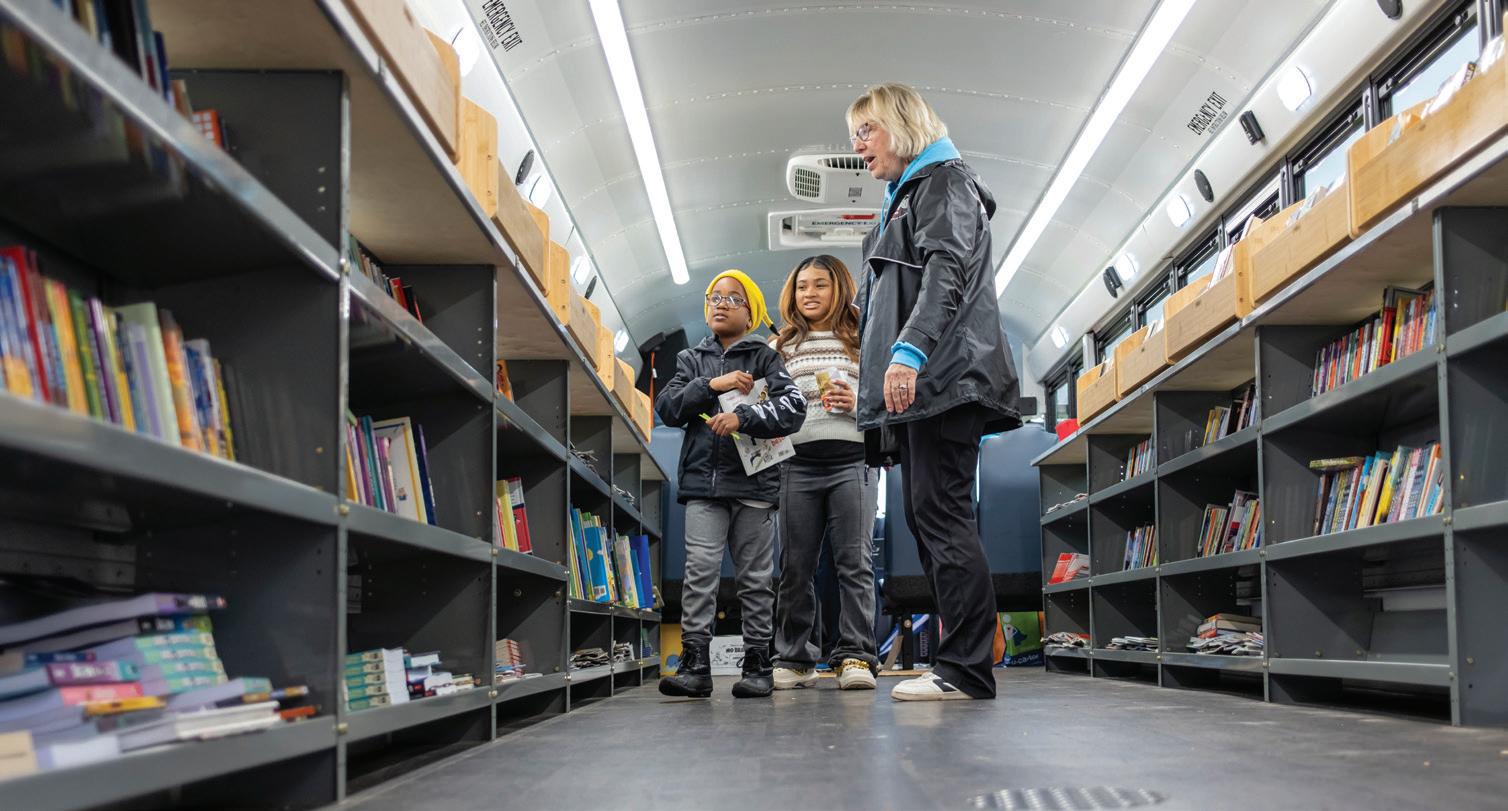
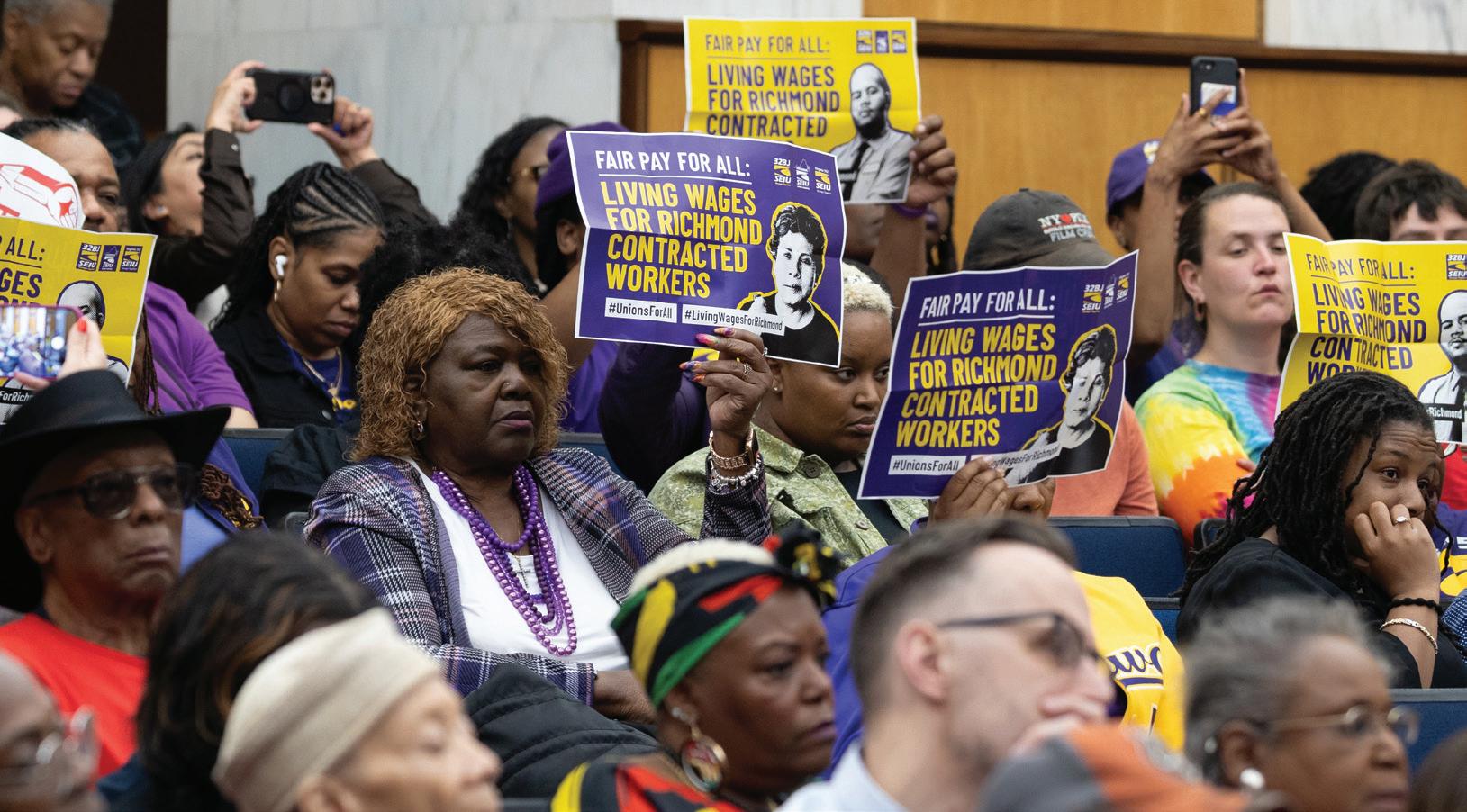
By Victoria A. Ifatusin
Riders won’t have to worry about paying for the bus anytime soon.
Ashley Potter, spokesperson for the Greater Richmond Transit Company, told The Richmonder last Wednesday that zero-fare will remain in place for fiscal year 2026, pending approval of the
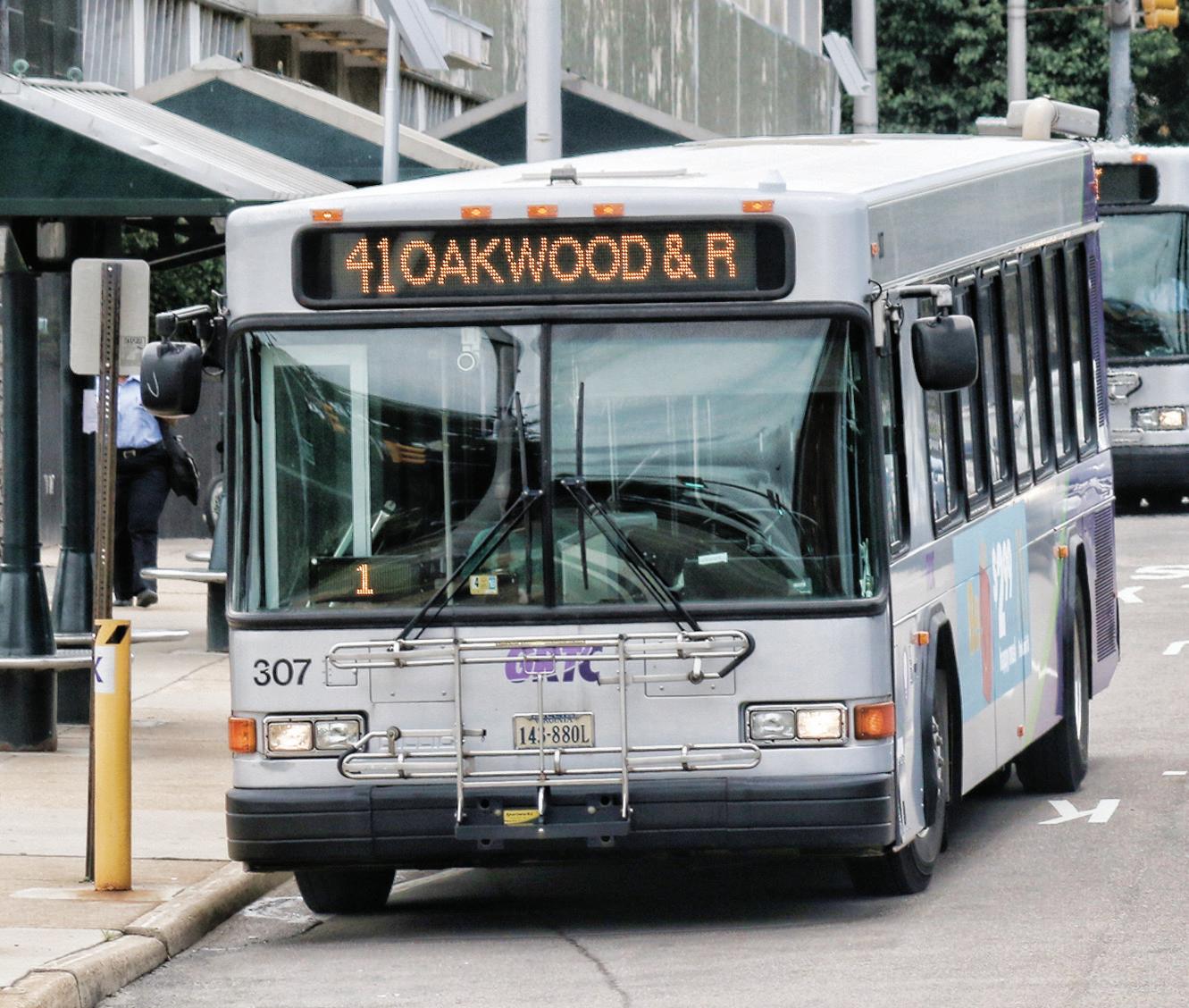
mond city, as well as Henrico and Chesterfield counties, is waiting for the ultimate approval from the board to adopt the budget on May 20. Potter hesitated in providing specifics of what will be funding zero-fare in the upcoming budget, but firmly stated GRTC is getting funding sources
Free Press staff report
Two prominent business leaders will deliver commencement addresses at Richmond-area universities in May.
Everette Taylor, CEO of Kickstarter, will serve as the keynote speaker at Virginia Commonwealth University’s universitywide commencement ceremony on Saturday, May 10. The event will be held 10 a.m. at the Greater Richmond Convention Center, 403 N. Third St., and will be livestreamed at www.vcu.edu.

Taylor has led the crowdfunding platform since September 2022. Previously, he was chief marketing officer of Artsy, where he was recognized by Business Insider and Forbes as one of the world’s top CMOs. His career includes executive roles at Skurt, Qualaroo and Sticker Mule, as well as founding multiple companies, including EZ Events, which was acquired in 2011.
Tom Barkin, president and CEO of the Federal Reserve Bank of Richmond, will address graduates at the University of Richmond’s main commencement ceremony 2 p.m. Sunday, May 11, at the Robins Center.
Barkin has led the Richmond Fed since 2018, overseeing monetary policy, banking supervision and payment services for the Fifth Federal Reserve District. He also serves on the Federal Open Market Committee. Before joining the Fed, he was a senior partner at McKinsey & Company, where he held roles including chief financial officer and chief risk officer.
Early voting begins in Richmond for June 17 primary
Early in-person voting for the June 17 primary starts on Friday, May 2, and continues through Saturday, June 14. Richmond voters can cast their ballots at the Office of Elections at 2134 W. Laburnum Ave.
Voting hours are Monday through Friday, 8:30 a.m. to 5 p.m., with additional Saturday hours on June 7 and June 14 from 9 a.m. to 5 p.m.
No excuse is needed to vote early in Virginia. Bring an acceptable form of ID or be prepared to sign an ID confirmation statement.
For more information, visit elections.virginia.gov
Free Press staff report
The syncopated rhythms of marching bands have long been a hallmark of HBCU. Now, a Virginia State University professor is digging into that legacy with support from one of academia’s most competitive grants.
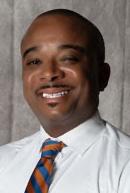
Samuel Rowley, chair of VSU’s Department of Music, has been named a 2025 American Council of Learned Societies HBCU Faculty Grantee. He is one of 12 scholars nationwide to receive up to $10,000 for humanities research through the program.
Rowley’s project, “The History and Evolution of the HBCU Wind Band Movement,” traces how these ensembles shaped musical traditions across North America. The funding will support his forthcoming book on the subject.
“I have always taken pride in being a musician, educator and researcher,” said Rowley. “This grant will enable me to complete my research and publish my forthcoming book.”
The ACLS program, developed with HBCU leaders, includes an additional $2,500 for each recipient’s institution to bolster humanities initiatives.
“ACLS is proud to support this vibrant group of scholars and celebrate their important contributions to the humanities and interpretive social sciences,” said Nike Nivar Ortiz, ACLS Program Officer. Rowley expects to complete his research by late 2026.
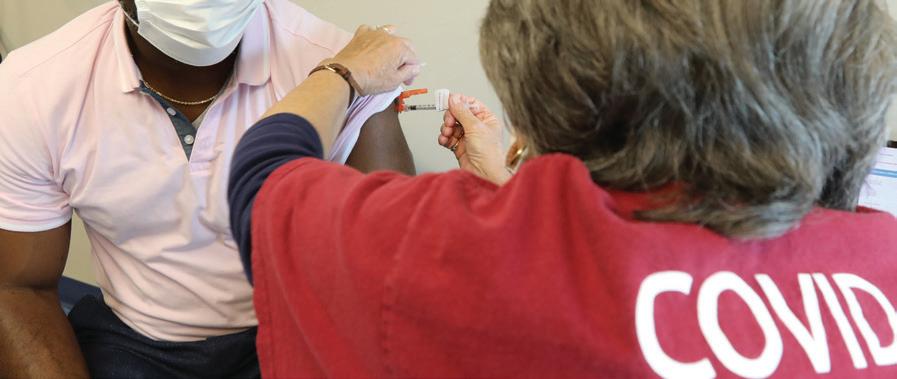
For the week ending Saturday, April 12, COVID-19 represented 0.5% of all emergency department visits in Virginia. Overall, respiratory illness rates were minimal and continued to trend downward compared to previous data. No COVID-19-related deaths were reported at press time.
As of April 6, COVID-19 wastewater data for Richmond and Henrico County were unavailable. CDC monitoring from March 30 to April 5 detected high viral activity across Virginia, with reports from six sites statewide. The highest concentrations were found in the northwestern and southwestern regions, as well as in Petersburg. For Virginia Department of Health testing locations, visit vdh. virginia.gov. Additional testing site information can be found at vax.rchd.com. Want a COVID-19 vaccine?
The CDC recommends the COVID-19 vaccine for everyone 6 months and older. Pfizer-BioNTech and Moderna vaccines are approved for those 6 months and older, while Novavax is for individuals age 12 and older. To schedule an appointment with the Richmond and Henrico health districts, call 804-205-3501. A list of pharmacies and clinics offering the vaccine is available at vaccines.gov. Additional locations can be found by texting your ZIP code to 438829 or calling 1-800-232-0233. Final Weekly Report
This will be the final installment of the weekly COVID-19 report for now. However, we will continue to follow and report on the impact of COVID-19 in our community as developments arise. We encourage readers to stay informed, take precautions and stay safe.
Compiled by George Copeland Jr.
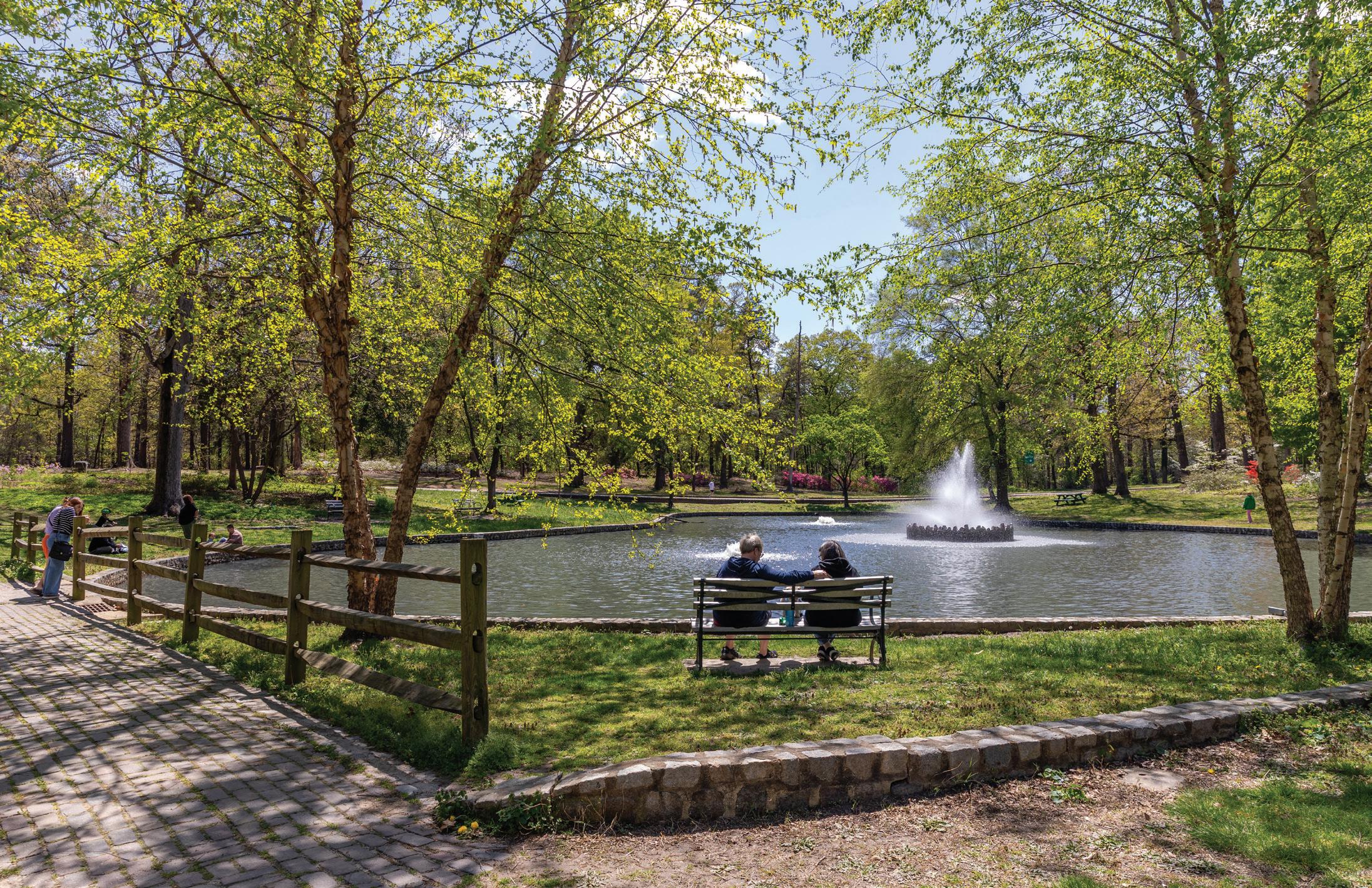
Slices of life and scenes in Richmond
The Friends of Bryan Park hosted a celebration Sunday, April 13, to mark the completion of the Azalea Garden Pond restoration. The three-year, nearly $120,000 project, in partnership with the Department of Parks, Recreation and Community Facilities, revived the fountain for the first time in 14 years, bringing new life to a cherished park feature.
By George Copeland Jr.
A crowd of more than 200 people gathered in the Richmond Police Training Academy last week, to weigh in on a hotly debated section of the Fall Line Trail planned through Bryan Park.
Bells echoed throughout Richmond’s North Side before the meeting as many participants arrived on bikes, locking them away on temporary racks outside the Academy. The number of people present for the meeting filled the room to capacity, forcing some to watch through open doors.
The mood before the meeting was warm, but the size of the crowd underscored just how invested the community is in the Bryan Park segment’s development. City officials emphasized that interest throughout the evening.
“My goal tonight is for people to have a voice,” said 3rd District City Council member Kenya Gibson, whose district includes Bryan Park and who was among the officials at the meeting. “The city will be sharing some thoughts, but by and large, I want this time to be an opportunity for us to hear from each other.”
The segment through Bryan Park is set to be part of a 43-mile, $400 million multi-use trail from Ashland to Petersburg. The Richmond segments are still in progress, and the meeting marked the first time analysis behind the trail options for Bryan Park was provided to the public, according to officials.
Of the options showcased, most public support was focused on one from Bellevue Avenue to Hermitage Road. Safety, accessibility and the project’s economic impact were frequent benefits cited before and during the meeting.
“This is the best way to get people into nature, into the park,” said Brantley Tyndall, director of Bike Walk RVA at Sports
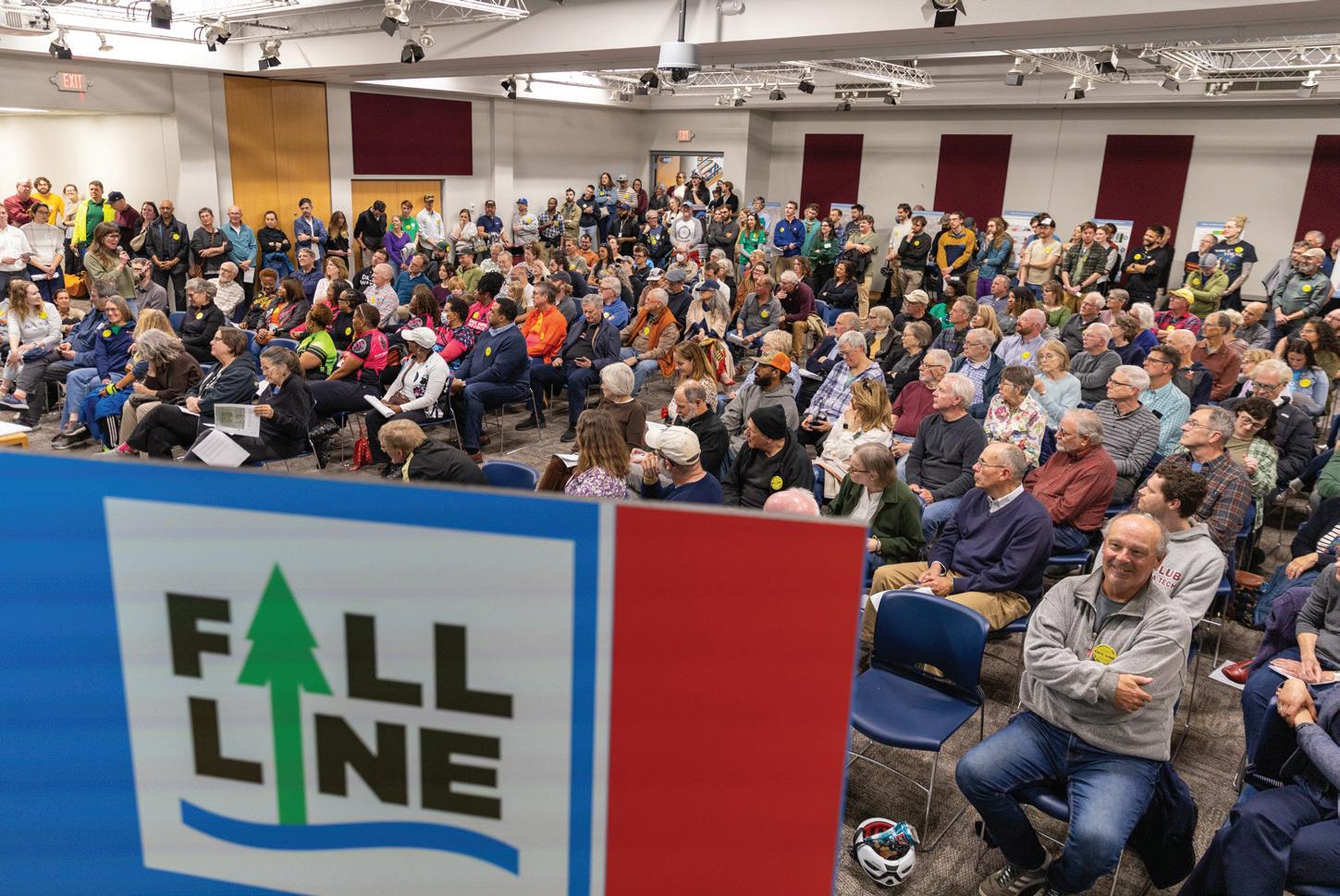
Backers, who have been a major part of the project. “It’s going to make the whole park much more accessible to people that really can’t access the park today or don’t feel safe doing so.”
Not everyone present supported the plans shared. Members of Citizens for a Responsible Fall Line Trail and other participants voiced concerns over the environmental and financial costs, as well as park visitor safety and the Trail’s impact on parking, nearby traffic and the park itself.
Members of the group, who have objected to Trail proposals and how public discussions have been handled in the past, stressed that people can support it and the park, but their questions still led to pushback from others in the crowd.
While Tyndall believes consensus and
compromise on the Trail is possible, some trail critics left the meeting dissatisfied.
“It was a charade, a dog and pony show,” Citizens for a Responsible Fall Line Trail co-founder Chuck Epes said. “Frankly, our experience with Sports Backers and now unfortunately City officials should be a real warning to the rest of this city.”
Epes later took his group’s concerns to City Council during their meeting Monday evening in hopes of a pause and re-examination of the project, including planned routes through neighborhoods across Richmond.
“I’m here to ask you to please get engaged as quickly as possible in this project,” Epes said, “and understand and learn what’s going on in your district with this project.”
Free Press staff report
Hanover County has named Binokhar “Bino” Harris as the new deputy chief of Hanover County Fire-EMS, with the appointment set to take effect May 1.
Harris brings nearly three decades of experience in public safety, most recently serving as assistant fire chief in Prince George’s County, Md. His background includes emergency management, fire investigations, interagency coordination, operations and strategic planning.
“We are very fortunate to have someone with Deputy Chief Harris’ breadth of experience join our department,” Hanover
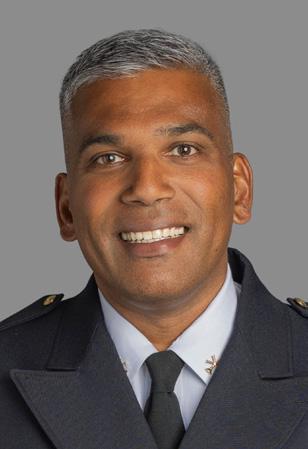
Binokhar Harris
County Fire-EMS
Chief Christopher J. Anderson said. “His background in managing complex incidents and major public safety initiatives will be invaluable.”
In his previous role, Harris directed operations in a jurisdiction covering 499 square miles and managed resources across 45 stations with more than 300 personnel.
Over the course of his career, he also has served as a fire investigator, bomb techni-
cian and canine handler, and was assigned to the FBI’s Joint Terrorism Task Force.
He has earned multiple awards, including the Silver Medal of Valor and several citations for meritorious service.
Harris holds an associate in fire science from the College of Southern Maryland and a bachelor’s degree in fire administration from Columbia Southern University. He also is a graduate of the Executive Fire Officer Program at the National Fire Academy.
“It is an honor to join Hanover FireEMS and serve this community,” Harris said. “I look forward to advancing the department’s legacy of excellence.”
Free Press staff report
Last week, the Metropolitan Business League (MBL) selected 117 Richmond small businesses to receive grant disbursements from the Small Business Recovery Grant Fund, which provides financial support to businesses impacted by the January water outage. The program is a public-private partnership administered by the MBL that is funded by $500,000 from the City of Richmond Economic
Development Authority (EDA), Dominion Energy and Altria.
“We are grateful to be able to offer some measure of respite for small businesses in the City who are feeling the financial strain caused by January’s water crisis,” said Mayor Danny Avula.
“Being able to distribute these funds is not just about relief, it’s about showing our small business owners that Richmond stands with them and that we are committed to this recovery, together.”
The MBL, in partnership with Bridging Virginia,a nonprofit community development loan fund, ran a multistep review process. Of the 199 applications submitted, 139 met the required eligibility criteria. The criteria included demonstrated fiscal impact, impact statements and water dependency assessments. A panel of public and private stakeholders then reviewed and scored the applications to assess the overall economic hardship incurred as
a result of the water outage. Based on fund availability and review criteria, nearly 85% of eligible applicants will receive a $2,500 or $5,000 grant. Restaurants and food service businesses represent the majority of awardees at 61%, followed by personal service businesses (such as hair and nail salons) at 14%, with the remainder of awards spread across other industries. Funds will be distributed to recipients later this month.
State Sen. Aaron Rouse, D–Virginia Beach, speaks to a Senate subcommittee in January 2024, at the General Assembly Building. Rouse, a candidate for lieutenant governor, has discussed the effect of federal budget cuts and layoffs on the campaign trail.
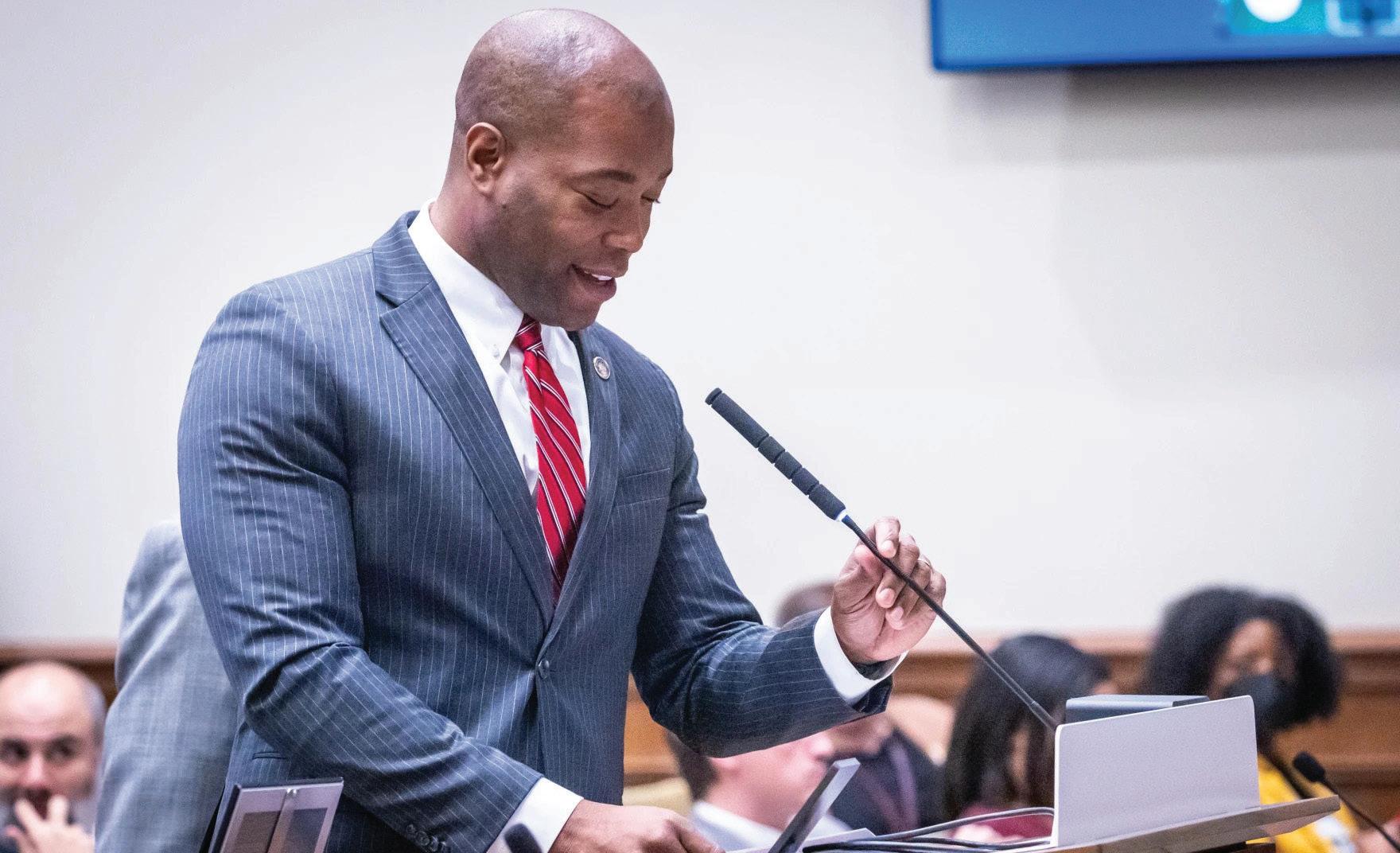
By Jahd Khalil
New policies affecting the federal bureaucracy and workforce are set to play a central role in Virginia’s 2025 Democratic primaries, observers told VPM News.
In 2021, almost two-thirds of the primary votes were cast in two areas with heavy concentrations of federal jobs and money: Northern Virginia and Hampton Roads. Almost 90% of Virginia’s Democrats are located in those two regions or Central Virginia.
Sabrina Mattin, co-president of the Fairfax County Young Democrats, said uncertainty around President Trump’s moves to dramatically shrink the federal government are driving interest in Virginia elections.
“Federal politics are local politics in a sense. We’re deeply affected by what happens in D.C.,” said Mattin in an interview Tuesday. “Right now, we’re seeing a huge surge in people who want to participate in local politics.”
Eric Claville, a political analyst with Norfolk State University, said Virginia’s off-year elections are a bellwether not just because they happen shortly after a new presidential term begins, but because Virginia feels the effect of federal policy more quickly than other states — unlike states like New Jersey which also have off-year elections.
“The newly sworn-in president has about 180 days to enact policy and to determine whether there is a high degree of popularity or disdain for those policies. Those numbers and those policies trickle down to the Commonwealth of Virginia immediately,” said Claville.
The candidates are seemingly aware of Wash-
ington’s importance in the primary, too. State Sen. Aaron Rouse, D–Virginia Beach, mentioned Trump and billionaire Elon Musk — who has been overseeing many of the federal cuts through the Department of Government Efficiency — when he announced new fundraising figures. State Sen. Ghazala Hashmi, D–Chesterfield, spoke at an anti-Trump protest earlier this month.
Rouse and Hashmi are two of six candidates seeking the Democratic nomination for lieutenant governor. The field also includes former Richmond Mayor Levar Stoney; Babur Lateef, chair of the Prince William County School Board; former federal prosecutor Victor Salgado; and union leader Alex Bastani.
Incumbent Attorney General Jason Miyares will not face a Republican primary in his re-election bid, but two Democrats are vying to challenge him: former Delegate Jay Jones, D–Norfolk and Henrico Commonwealth’s Attorney Shannon Taylor.
In the governor’s race, both candidates — former Democratic U.S. Rep. Abigail Spanberger and Republican Lt. Gov. Winsome Earle-Sears — went unchallenged for their party’s nominations.
Marty Cohen, a professor of political science at James Madison University, said federal policies might have an effect on the general election, too.
“As Northern Virginia has crept into Virginia [politics] more and more, that has obviously changed the dynamic of the entire state, and Democrats have become more competitive for that reason,” Cohen said.
The primary is set for June 17. Early voting begins on May 2.
This story originally appeared at vpm.org
The Associated Press Leaders at PepsiCo met on Tuesday with civil rights advocates from the National Action Network to discuss the company’s recent decision to roll back some of its diversity, equity and inclusion initiatives, according to the Rev. Al Sharpton.
“This morning, I and several members of NAN met with PepsiCo Chairman Ramon Laguarta and CEO of PepsiCo North America Steven Williams for more than an hour to discuss our grievances over reports they were rolling back nearly $500 million in DEI commitments,” Sharpton stated in a press release. It was a constructive conversation, which PepsiCo agreed to hold within the 21 days we gave them to meet. We agreed to follow up meetings within the next few days.”
In an April 4 letter to PepsiCo CEO Ramon Laguarta, Sharpton threatened to lead a boycott against the company. PepsiCo — one of the largest
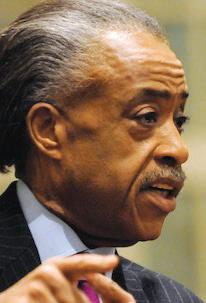
food and beverage companies in North America whose brands include Gatorade, Lay’s potato chips, Doritos, Mountain Dew as well as Pepsi — told employees in February that the company will no longer set goals for minority representation in its managerial roles or supplier base.
Sharpton said following continued discussions, he and National Action Network
Chairman Dr. W. Franklyn Richardson — both former members of PepsiCo’s African American Advisory Board — will make a final decision and recommendation to the organization regarding future actions toward the company. “As we continue to deal with a broader swath of corporations with whom we will either boycott or buy-cott.” Sharpton stated.
A spokesperson for PepsiCo did not immediately respond to a request for comment. PepsiCo is one of several companies, including Walmart and Target, that have eliminated policies and programs aimed at increasing diversity among its employees and reducing discrimination against members of minority groups, women and LGBTQ+ people since President Trump returned to the White House earlier this year. Trump ended DEI programs within the federal government and has warned schools to do the same or risk losing federal money.
In January, Sharpton led a “buy-cott” at Costco, encouraging Americans to vote with their dollars and shop at the retail giant for its commitment to DEI policies, even as many of its competitors phased them out.
“That is the only viable tool that I see at this time, which is why we’ve rewarded those that stood with us,” Sharpton told The Associated Press. The Free Press staff contributed to this report.

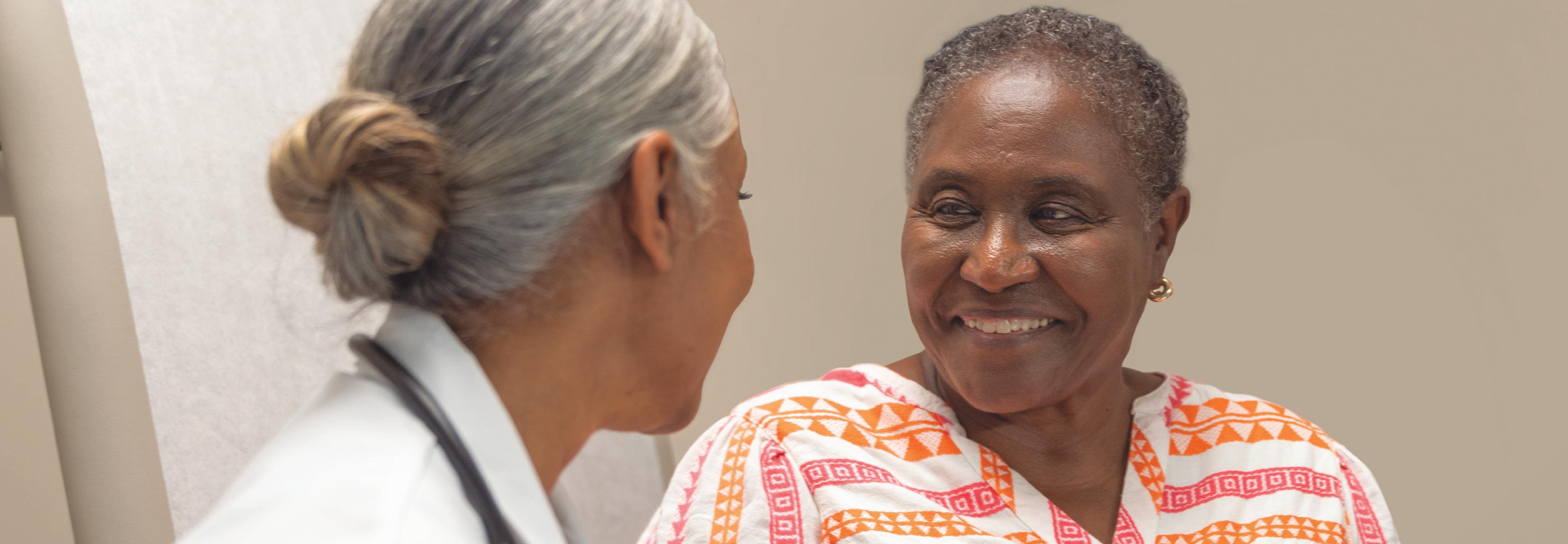

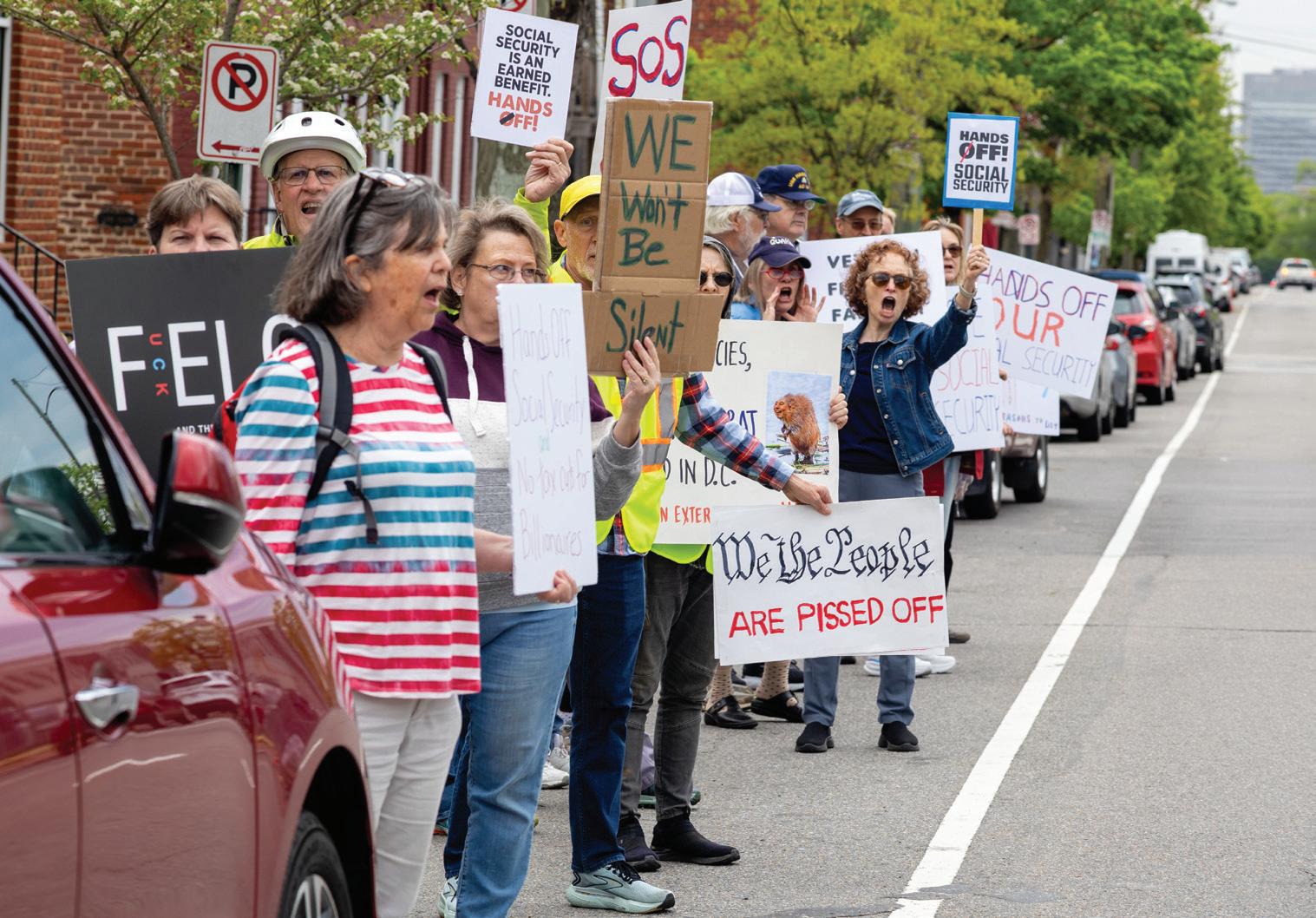
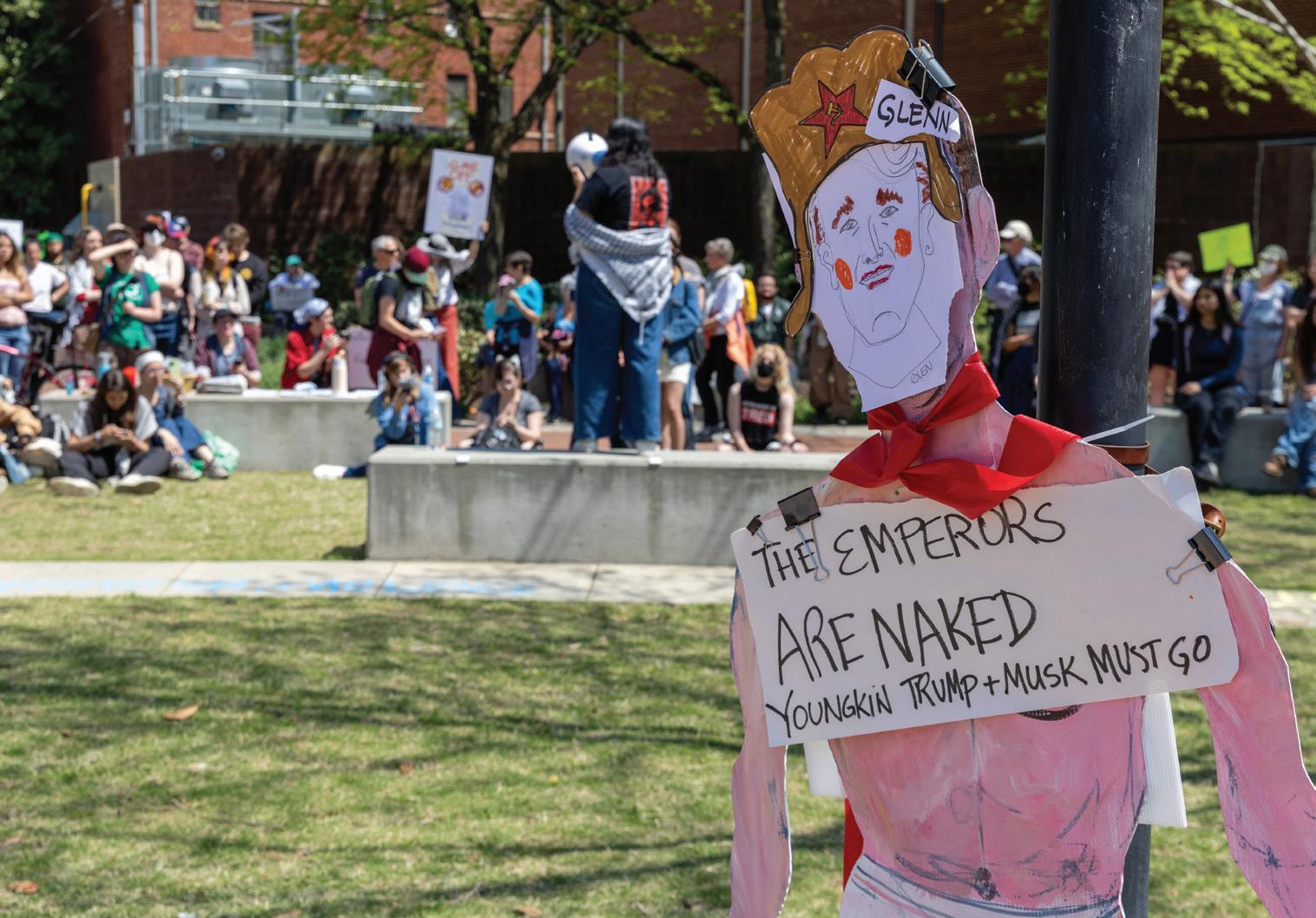
She’s like, ‘the system’s down,’” SubrayanBailey said.
The Social Security Administration implemented new measures Monday, which President Trump and Elon Musk, senior adviser to the president, have described as an effort to reduce fraud. The agency announced it will begin conducting “fraud checks” on all phone applications for benefits. Applications flagged as potentially fraudulent will require applicants to verify their identity in person at a Social Security office.
Subrayan-Bailey later joined about 30 protesters outside the Social Security office on Cary Street, demonstrating against what they viewed as threats to the agency under Elon Musk’s Department of Government Efficiency (DOGE). Their concerns were heightened later that day by a memorandum signed by the president.
A change to policies prevents beneficiaries from updating direct deposit information over the phone, which could create accessibility problems for those living far from physical Social Security offices. According to a report by the Center on Budget and Policy Priorities, less than one hundredth of a percent of the total $1.5 trillion in benefits distributed last year was lost due to direct deposit fraud.
Outside the office, there was a cardboard cutout meant to represent U.S. Rep. John McGuire (R) tied to a tree. Jennifer Strozier, the co-chair of the Goochland Democratic Committee, said the cutout was originally made for a town hall meeting, which Maguire was expected to attend but did not.
“We’ve been taking him around because John McGuire is impossible to reach on the phone or in person. He has an office in Lynchburg that he is never at. It took him months to put a phone in there and it still I think has a weird recording that doesn’t identify it as John McGuire’s phone,” Strozier said.
Strozier said McGuire, who is “deeply in the pocket of Donald Trump,” has supported policy changes in line with DOGE’s attempts to reduce fraud that make it harder to access Social Security resources online, especially for rural Virginians, such as those who live in McGuire’s 5th congressional district.
McGuire’s office was contacted for comment, but did not reply at the time of publication.
On the same day as the protest, the president signed a memorandum that claimed to end Social Security retirement benefits for undocumented immigrants, which was already the law. The memorandum also expands Social Security’s fraud prosecutor program to at least 50 U.S. Attorney offices, according to the White House.
Recently, the Social Security administration announced plans to lay off 7,000 employees, about 12% of their workforce, in compliance with DOGE. Although the Trump administration has said it intends to protect Social Security, Virginia Senator Ghazala Hashmi, who attended the protest, said the administration has already taken steps to dismantle and privatize it, citing impending layoffs and impacts to services.
“They have fed misinformation all across the country arguing that Social Security is going bankrupt, that it’s a handout and all of those are lies. It’s not going bankrupt.
“It is the retirement plan for hundreds of millions of Americans,” Hashmi said.
where students staged a walkout at noon on Monday. Students involved in Students for Justice in Palestine held a walkout in protest of these actions on Monday. Sereen Haddad, student at VCU and proPalestinian activist, explained that the pro-Palestinian movement stood up for international students because the issues are intertwined.
“I think that these actions and the visa revocations do send a very disturbing message that anyone at any time really can be targeted. And it’s not just about immigration status, it’s about repression. It’s about kind of sending a warning to every student who does dare to speak, organize or resist,” she said.
In the same statement, Rao said the university “stands with the international community,” though Haddad said that support hasn’t been reflected in the school’s actions.
“I mean that that’s quite literally VCU’s entire branding that they’re ‘UNcommon’ and that they’re diverse. Yet when it comes to protecting that international community and the students that make it diverse, they back down and
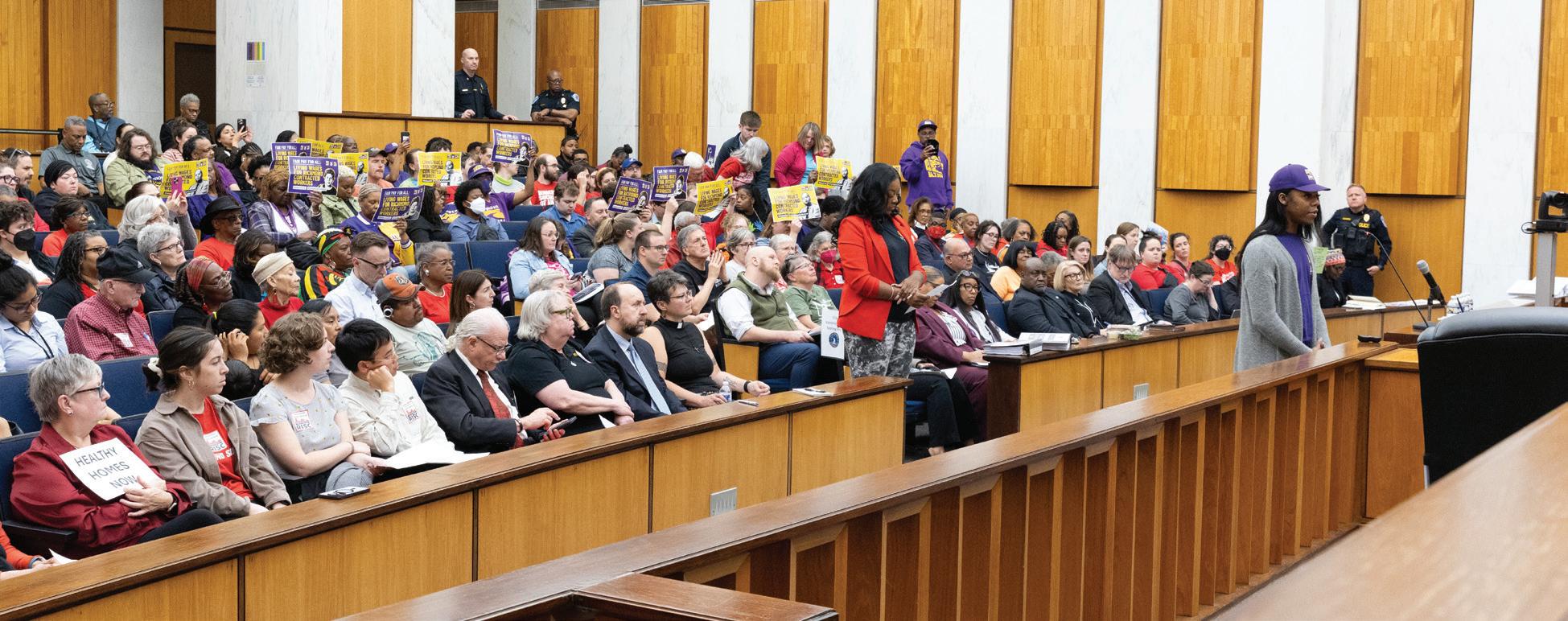
Continued from A1
for the budget.
Drafted Council proposals include over $3 million in personnel reductions, a $16 million reduction in capital project cuts, almost $21 million in additional spending and amendments to Avula’s budget. Many of the amendments seek to partially or fully restore funding of programs and positions reduced in or absent from Avula’s proposal.
City officials emphasized the need for caution to navigate the economic challenges ahead. Additional hurdles include the cancellation of a $12 million federal water treatment plant repair grant and a Mayo Island redevelopment project that could result in a $7.5 million payback if not completed.
With the finalized budget due by Thursday, May 15, the lack of time to submit and examine amendments, which were first discussed Wednesday, continued to
be an issue across both budget sessions.
As a result, council members occasionally clashed with officials and each other.
“We have a few weeks to do what has taken you months,” Ellen Robertson, 6th District, said during a discussion with Interim Chief Administrative Officer Sabrina Joy-Hogg.
The final budget work session will be held Monday, April 21, with council amendments due to be submitted to the city attorney by 5 p.m. and a proposed public comment period set for 6 to 7:30 p.m.
Continued from A1
Even if GRTC were to remove free fares, Potter said it could take up to two years for riders to actually begin paying after making such a decision, noting that fare buses and payment systems have been removed from buses, and operators would need to be trained again.
“There’s a whole process we’d have to go through and it would certainly take some time,” she said.
GRTC introduced zero-fare during the COVID-19 pandemic to reduce contact between bus drivers and riders, and since then, the program has remained in place.
Potter said GRTC has seen increased ridership due to it. What helped keep the program in place was the state’s Transit Ridership Incentive Program (TRIP), an $8 million grant from the Department of Rail and Public Transportation. The grant was in place from 2023 to 2025, decreased over time, and required local funders to match some of the money. VCU was a local matcher, providing $3.8 million for the three years. This year, the university decided to not continue contributing. GRTC also was matching the grant with $8.5 million over the three years. Keeping zero-fare in place results in a
$6.8 million loss, which is 6% of GRTC’s total proposed budget for fiscal year 2026.
Mayor Danny Avula announced in late March that his proposed city budget will include $9.4 million for the agency, which is an increase of $171,714 over last year.
Potter said GRTC is looking at keeping zero-fare in place long term after fiscal year 2026 by finding “community partners who believe in equitable, free transportation for the Richmond region.”
But for the foreseeable future, Potter said the company and board members are “100% committed to maintaining zero fare.”
This story originally appeared at TheRichmonder.com.
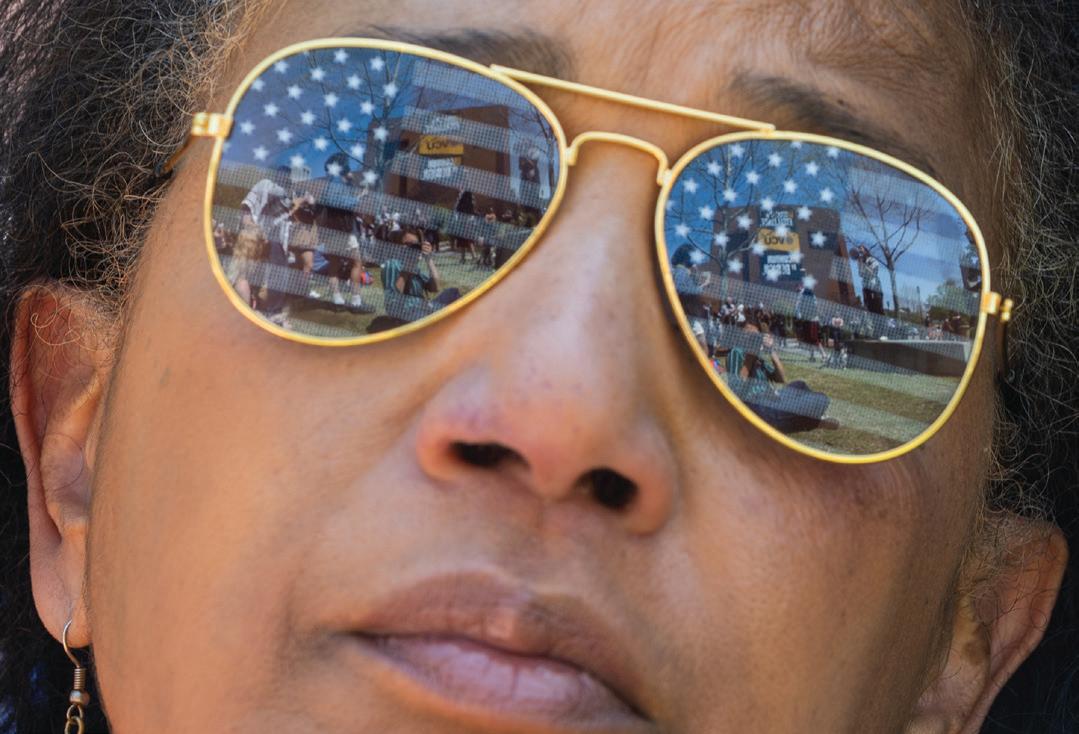
they don’t stand by that promise,” Haddad said.
About 10 university professors attended the protest. Mark Wood, an associate professor of religious studies, said he was disappointed by the turnout of his peers, but noted that some faculty members may fear backlash for speaking out.
“They’re afraid that if they get involved, they’re going to be on a list and they’re more likely to be subject to some sort of disciplinary action or worse, you know, given what’s going on right now,” he said.
Last week, international students received an email from the Global Education Office which instructed them to carry documents with them at all times, and reminded them that Immigration and Customs Enforcement (ICE) does not need a warrant to request documentation from people in public.
Zarina Fazaldin, who attended the protest to support international students, traveled from India to Virginia to pursue a graduate degree at VCU in 1987. When she first came to the country, she felt supported by the community in Richmond, something that has changed in recent years, she said.
“It was very different. Life
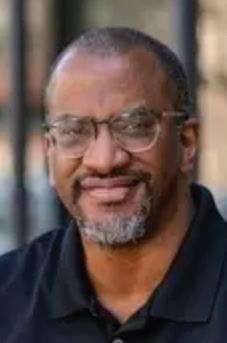
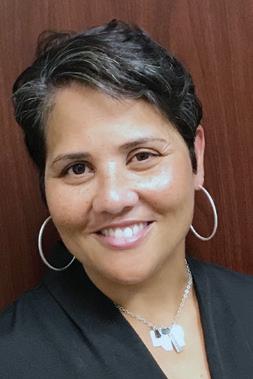
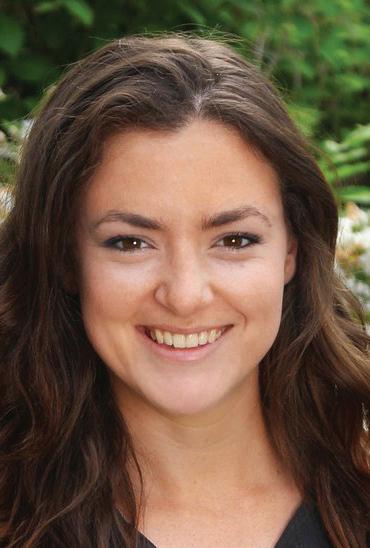
was different. We didn’t have to worry about not carrying anything. Of course, I always had my VCU ID, but I didn’t carry my passport or anything. Things have changed now. We all have fear. Even though I’m a citizen we still have fear,” Fazaldin said.
Fazaldin finds it odd that the United States is attempting to reduce the number of international students, especially because those who come to the United States are already investing a lot in the country, she said “We leave our family, we stay far away. But because of education, because of the opportunity, (because) of free speech. If you work hard, your life will get better,” Fazaldin said, “This is why America is the land of opportunity. Now it looks like we are doing something wrong coming to study here.”
The university said, due to privacy laws, it could not disclose the criteria for student visa terminations, whether affected students were in U.S. Immigration and Customs Enforcement custody, or whether ICE agents are allowed to enter campus classrooms. It also could not confirm whether there is a plan to let affected students complete their degrees online.

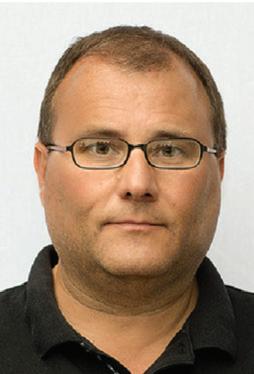
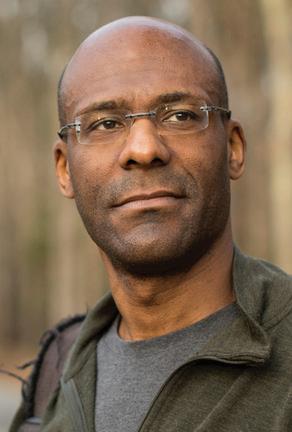
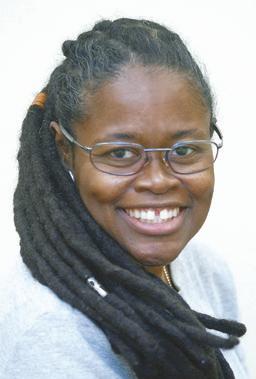
Free Press staff earns honors in statewide journalism contest
Continued from A1
the newsroom’s dedication. “These honors reflect our team’s commitment to serving Richmond with quality journalism,” he said. “We’re proud to continue this tradition.” Additional winners included Julianne Tripp Hillian for Feature Photography, James Haskins for Sports News Photography and Regina H. Boone for Pictorial Photography. Founded in 1992, the Free Press has now earned more than 300 awards for journalism and advertising excellence.
By Nathaniel Cline
Spring has officially arrived across Virginia, and with it comes travel plans for many as students prepare for upcoming spring breaks. From popular destinations to hidden gems, Virginians are exploring the Commonwealth in greater numbers as the weather warms.
Travelers will likely get some help navigating their journey with technology developed by Virginia native Gladys West, who was key in creating the Global Positioning System (GPS). While sharing insights from her groundbreaking career, West, like many Virginia schoolchildren, also had spring break top of mind. She said her favorite place in the state to visit with her late husband, Ira West, was Williamsburg.
“It has history to discover, outlets for shopping, good food and a quiet atmosphere,” 94-year-old West said in an interview.
Born in Sutherland in Dinwiddie County, West is a pioneering mathematician who made valuable contributions to several technological advances that helped transform the way humans navigate the world and understand its dimensions. The state honored her with a resolution passed by the Virginia General Assembly in 2018.
Beginning in 1956, West began to carve out her most notable work at the Naval Proving Ground, now called Naval Support Facility Dahlgren in King George County.
The second African American woman hired at Dahlgren and one of only four African American employees at the time, she was known
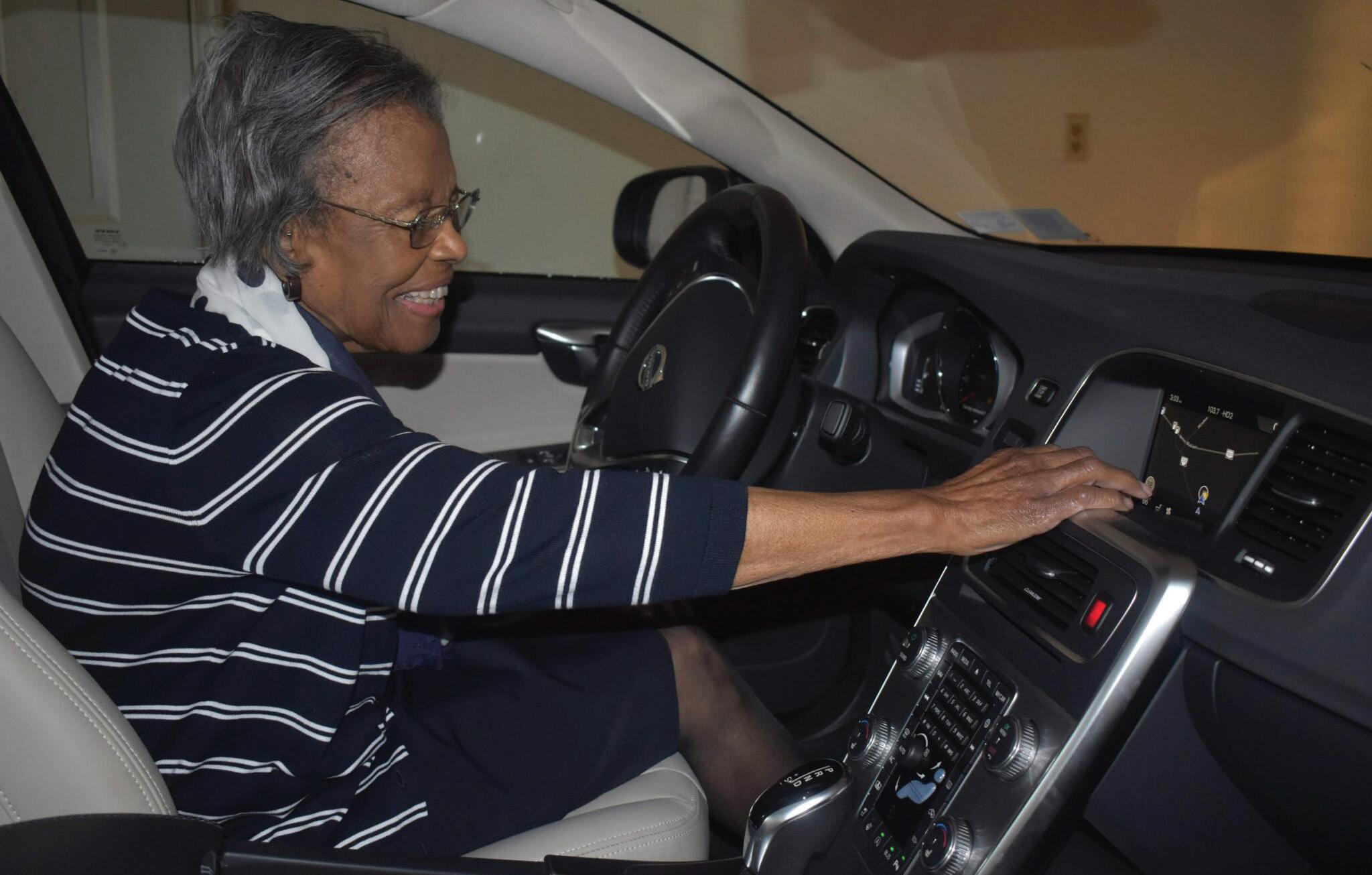
for her skill in calculating complex mathematical equations and computer programming.
West excelled working on satellite geodesy, which is used to make measurements of the Earth, and other satellite measurements that contributed to the accuracy of GPS. The technology is now used in cars and on devices globally. She also received commendation as the project manager for the radar altimetry data processing project of Seasat, the first satellite designed for remote sensing of the Earth’s oceans.
West retired with 42 years of service
One of her earliest motivations to be successful was simple: keeping tidy. When West was young, she had to help out on her family’s farm even if it meant getting dirty, which she despised.
“I aspired to do something outside of farm work and I knew that having a good education would be the key,” West said. “That motivated me to do well in school so that I could get a scholarship and go to college. I had a great support system and many
mentors along the way who kept me motivated.”
She graduated from Virginia State University with a bachelor’s degree in mathematics, and earned her master’s of public administration from the University of Oklahoma and a doctorate in public administration from Virginia Tech. Between her studies, West also taught in Sussex County. Today, she continues to be recognized for her work. She published her memoir “It Began with A Dream,” in 2020. Spring travel Motoring around Virginia during
spring should be a relief to drivers, compared to a year ago.
According to AAA, the state average for a gallon of gas has dropped from last year’s $3.45 to $2.96. The national average is $3.16 as of Wednesday.
Clean car drivers are subject to paying an average of 34 cents per kilowatt hour for electricity in Virginia and nationwide.
Juliana Thomas, a spokeswoman for Virginia Tourism Corporation, home of Virginia Is For Lovers, said “Virginia absolutely shines in the springtime.” Thomas touted several areas as great destinations including Alexandria, named one of the Top Spring Travel Destinations by NBC, and Williamsburg, home to Busch Gardens — one of two theme parks in the commonwealth.
“From vibrant cities to charming historic towns, breathtaking outdoor escapes, and family-friendly coastal getaways, the commonwealth offers a diverse array of getaway options, with something that will appeal to every traveler,” Thomas said.
West said it’s always refreshing to hear how her work is now being used outside of the government and said she is still amazed by the technological advancements navigation has made since the GPS Project began in 1973.
“It never gets too old,” West said. “I am just so pleased that I was able to make a contribution. When I was working, I never imagined that the GPS would be used in the civilian world. I love seeing all the ways that it can be used and I probably have no idea how vastly used it is.”
This story originally appeared on VirgniaMercury.com.
By Thalia Beaty
The Associated Press
Bernice King warns decades of work to reduce inequities in housing is at risk, as the Trump administration cuts funding for projects and tries to reduce funding for nonprofits that handle housing discrimination complaints.
“I shudder to think what’s going to happen — there’s still a lot of residential segregation,”
ened to discriminate because they know there’s nothing there to to stop it.”
In February, the U.S. Department of Housing and Urban Development canceled millions of dollars in grants to nonprofits that handle housing discrimination complaints. A judge temporarily froze the terminations, which HUD said targeted funding awards that included diversity, equity and inclusion, or DEI, language.
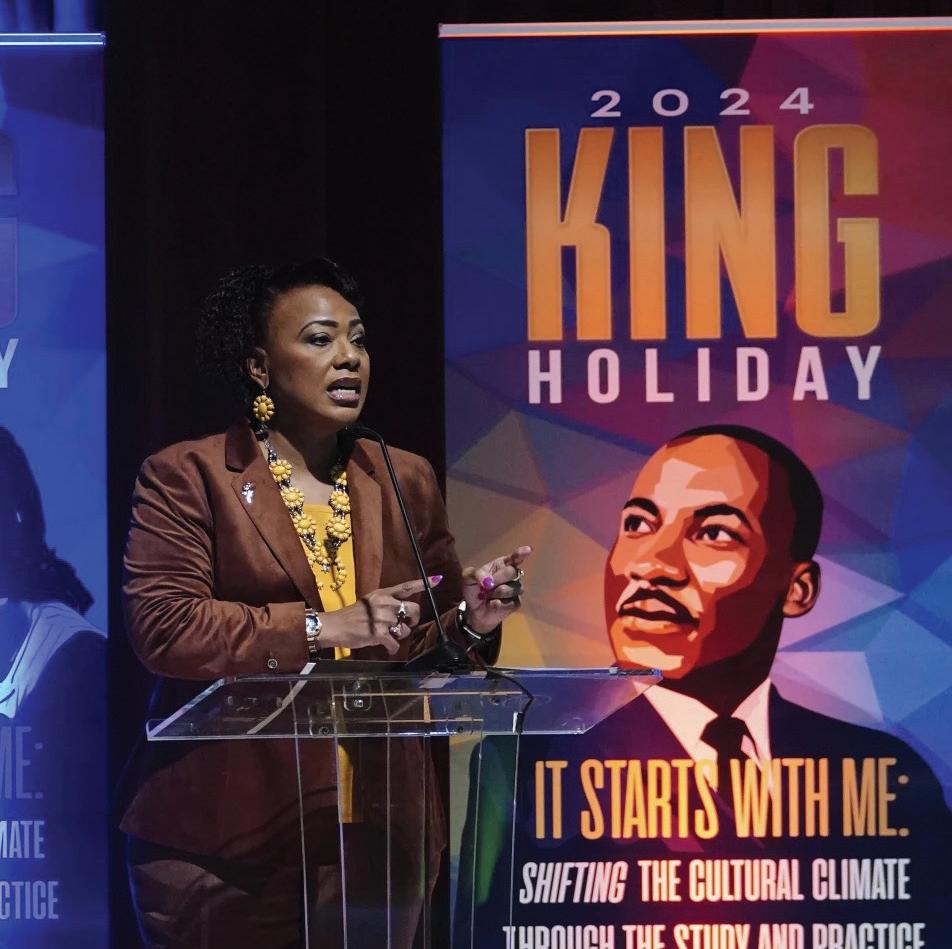
King, CEO of The King Center and the youngest daughter of the late civil rights leaders Dr. Martin Luther King Jr. and Coretta Scott King, told The Associated Press. “It’s better than it was during my father’s lifetime. But going forward, we may end up right back where we were in the ’50s and in the ’60s. People will feel very embold-
The department will uphold the Fair Housing Act and combat discrimination in housing, a HUD official said,. King said the attacks on what the administration calls DEI look familiar.
“To me, these are those same old historic, divide-and-conquer tactics to try to keep people fighting with each other and
keep people separated and keep a certain hierarchy existing in a society,” she said.
Continuing to press to end discrimination in housing
Whenever she can, King said she highlights her father’s legacy pressing for economic equality, including speaking Thursday at the Northwest African American Museum in Seattle, near where Habitat for Humanity of SeattleKing & Kittitas Counties is building a new condominium named after him.
The 58-unit apartment block is located on Martin Luther King Jr. Way in King County, which also is named for him.
Seattle Habitat CEO Brett D’Antonio, said naming the building after King offered a chance to talk about racial equity in housing, part of Habitat for Humanity’s efforts to raise awareness about fair housing, including its fundraising campaign Home is the Key, in April in remembrance of the Fair Housing Act’s passage.
Bernice King remembers when her father moved their family in 1966 to a third-floor walk-up without heat in Chicago.
Dr. King came to Chicago to try to break through discrimination in housing, which left Black residents paying more in rent for worse conditions than white tenants.
King campaigned in Chicago, speaking to crowds of tens of thousands around the area and leading a march to City Hall to tape their demands on the front door. A week after he was assassinated in 1968, the Fair Housing Act was signed into law, which prohibited discrimination in housing based on race and other characteristics and created mechanisms to resolve complaints.
Bernice King said the dream of fair and equitable housing that the law’s passage signaled still has not been realized.
“To allow its provisions to be weakened is to betray the commitment and the sacrifices made to realize it,” she said.
Housing inequity continues today
Large discrepancies in homeownership between Black, Hispanic and white Americans persist today, though that is just one measure of inequity in housing access. The National Fair Housing Alliance found housing discrimination com-
plaints reached a record 34,000 in 2023, with most involving rentals and over half having to do with discrimination based on disability.
Diane Levy, who researches housing at the Urban Institute, said she was concerned about who will take future fair housing complaints if funding to nonprofits that handle those complaints is significantly diminished.
“If you experience discrimination, if it’s blatant, that takes a toll,” she said, adding even unseen discrimination limits where you can live and whether to rent or buy home, which, in
turn, limits where you can work or go to school.
Levy also noted the administration ended federal protections against housing discrimination based on sexual orientation and gender identity.
Bernice King said this moment calls for creativity and perseverance.
“People feel like it’s okay to discriminate — okay to suppress, oppress and deny,” she said. “It just means those of us who are on the side of standing up for what is right and fighting for freedom, justice and equality, having even more work to do.”




If you’re seeing this on your phone or computer, go ahead and take a moment to appreciate the irony — you’re reading about the governor’s call for “Virginia Screen-Free Week”... on a screen.
The governor’s office sent the announcement by email, naturally. Makes sense — those of us in the media are practically glued to our screens.
If the goal was to really drive the point home, they could’ve gone old-school: print the press release, slap a stamp on it, maybe even dust off the fax machine in the governor’s office. Assuming it’s still there — possibly tucked in a closet, a leftover from the McDonnell administration.
But back to that message on my screen from the governor’s office. Here’s what the week is about, it reads: “This statewide initiative encourages Virginians of all ages to take intentional breaks from phones, tablets and social media — and reconnect with family, community and the world beyond the screen.”
Hard to argue with that. We live in a world where notifications never stop, where doomscrolling is a pastime and where toddlers are being raised on YouTube, touchscreens and AI voices from electronic devices. Taking a break — even for a few hours — sounds like a luxury, but may be a necessity.
According to the release, excessive screen time and social media use have been linked to a range of mental health struggles for young people—everything from sleep problems and anxiety to rising depression rates. In the U.S., teens are spending nearly five hours a day on social media, and up to 41% of those using it for two or more hours daily say their mental health is poor or very poor. Suicide continues to be the second leading cause of death among young people ages 10 to 34.
Of course, stepping away from screens is easier said than done. For many of us, work, school and daily life revolve around them. Still, the idea behind Screen-Free Week isn’t to demonize technology, but to remind us that there’s life happening outside the glow of our devices.
“Virginia Screen-Free Week is a call to action — to hit pause on the noise of digital distractions and say ‘yes’to deeper connection, stronger mental health and a brighter future for our youth,” Gov. Youngkin stated in the press release.
So maybe this week, we put the phone down at dinner. Take a break from watching television shows that end up watching you. Try having a real conversation, face to face.
The screens will be there when we get back. But the moments we might miss while looking down? They can slip away for good.
There he is again, a friend said to me and pointed at the television. Why won’t somebody stop him? I took a look and wondered the same thing.
He’s always there, lurking in the background with a smirk and a suit, waiting for the perfect moment to ruin your day. Just when life starts to feel stable — bam — he tries to turn it upside down.
Maybe you’re backing out of the driveway, coffee in hand, thinking about your weekend plans. Or you’re about to close a big deal, finally ahead of the curve. That’s when he shows up. Not with advice or support—but with destruction.
Sometimes he’s like a stray shopping cart on a windy day. Sometimes he’s similar to a faulty ladder or a distracted driver. Other times, he’s just plain chaos in human form, bent on reminding you how fragile your peace really is.
And what happens after he causes the crash, the spill, the mess? Nothing. He walks away. He shrugs. Grins like it’s all a big joke. Meanwhile, we’re left with the cost, the consequences and the cleanup.
It’s maddening — watching someone cause so much damage and never being held accountable. No apology. No consequences. Just more mess, more drama, more “Oops, my bad,” as prices go up and stress levels climb.
You’d think, by now, someone would stop him.
Enough with the Mayhem commercials, Allstate. For some reason, they aren’t funny anymore.

In 2024, four women held the rank of four-star general or admiral. One year later, in 2025, there are none. This is just one example of how individuals and groups who believe in social equity and fairness are embroiled in a cultural war—and the opposing side is winning.
1970s, the Heritage Foundation has become the puppet master pulling the strings behind the scenes. Many right-wing politicians, media figures and influencers have joined in by effectively turning fear into a weapon in their anti-DEI movement.
didates, including Trump, turned social equity into a personal threat.
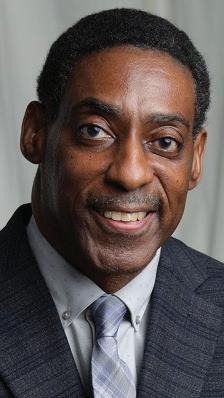
With the recent firing of Adm. Lisa Franchetti, the Navy’s first female chief, the U.S. military is left without a single woman with a fourstar rank. The significance of this firing highlights the fact that the glass ceiling, which had previously been shattered, has not only been put back into place but has also been lowered and made stronger. The barriers women have historically faced in the military have returned, with the prospect that Franchetti may be the last woman to achieve the four-star rank for a while.
Threatened by decades of social progress that produced fairness and justice for all people, the authors of Project 2025 sought to create a nation that allows discrimination in all forms to thrive where we live, study and work.
Let’s be honest: In the attack against the hard-fought victories toward social equity, the main culprits are not President Trump or Vice President Vance. Since the
‘Improper
President Donald Trump has signed an executive order that directs Vice President JD Vance to eliminate “divisive narratives” and “improper ideology” from Smithsonian museums, educational and research centers and the National Zoo.
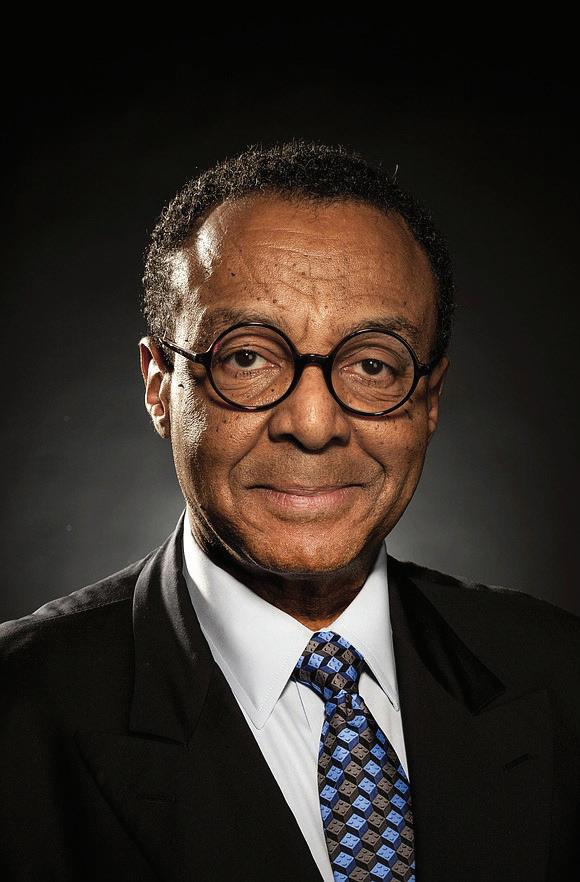
My im mediate reac tion? Surely, you jest, sir. Given this ad ministration’s dislike of di versity, equity and inclusion we suspect much of the content they’ll target will have to do with race — and there may not be any area of American discourse that is more divisive or conflict-ridden.
Who determines what ideology is “proper”? I suspect George Orwell would be dismayed by this development.
In Trump’s executive order last month, titled “Restoring Truth and Sanity to American History,” he denounced what he described as a “revisionist movement” across the country, one that “seeks to undermine the remarkable achievements of the United States by casting its founding principles and historical milestones in a negative light.”
Trump’s order criticized the Smithsonian’s National Museum of African American History and Culture for a graphic posted online in May 2020 that, I agree, should not have been posted. It referred to “hard work,” “individualism” and “the nuclear family” as part of “white culture.”
The graphic, which has drawn condemnation before, was swiftly removed after Lonnie Bunch, the Smithsonian’s secretary who was
In this current political climate, fear is far more effective than the politics of unity. The success of the anti-DEI movement is not because their arguments are factual. They
succeed because the puppet master and their supporters understand a fundamental truth: When people feel vulnerable, they are more likely to look for someone to blame. Former President Richard Nixon said it best: “People react to fear, not love. They don’t teach that in Sunday school, but it’s true.”
White women are the group that gained the most from affirmative action, which started in the late 1970s. The same group benefited the most through DEI initiatives from the late 1990s to 2000s. All of the social gains by white women are now in serious jeopardy.
The current administration campaigned on eliminating socalled “wokeness” and “DEI hires” in the federal government, the military and universities—and on pressuring corporate leaders to do the same. Right-wing can-
the founding director of the African American museum, agreed it was inappropriate. So did I. You didn’t have to be a conservative to be deeply offended by that illinspired excuse for satire.
In his executive order, Trump called for reshaping the Smithsonian into a “symbol of inspiration and American greatness.”
I thought it already was. Yet, as Trump’s jumbled drive for “government efficiency” has shown us, just because some government entity isn’t broke doesn’t mean Trump won’t try to fix it anyway.
By singling out the Smithsonian’s African American history museum, Trump fueled speculation that it could become a casualty of the administration’s wider war on diversity, equity and inclusion; critical race theory; and other academic points of view that critics find easier to denounce than understand.
Frankly, I think Trump should feel relieved the museum’s many exhibits do not highlight his own settlement of a 1973 racial discrimination case against his father and himself, brought by the Justice Department for the Trumps’ alleged refusal to rent apartments in predominantly white buildings to Black tenants.
Testimony showed the applications filed by Black apartment seekers were marked with a “C’’ for “colored,” a trick that was hardly unique in those days, as federal antidiscrimination laws were getting off the ground.
A settlement that ended the lawsuit did not require the Trumps to explicitly acknowledge that
White workers were misled into believing that racial diversity programs are the reason they can’t get ahead. They were led to believe that DEI initiatives are a threat because of lost opportunities, reverse discrimination and a shift in the status quo. They were misled into thinking that DEI policies unfairly prioritize race and gender over merit.
While a lack of understanding about the purpose and implementation of DEI initiatives contributed to negative perceptions—and to people being controlled and manipulated—white women should know better. The elimination of women’s power has been a goal of Project 2025. Any attack on DEI is meant to eliminate the power of women—all women.
Why would a white woman stand against diversity, equity and inclusion when she has benefited from the fight to ensure opportunities for promotions within the government, military and private sector?
Women need to support other women when the true threat and contrast have been made clear during election campaigns. How do we win this cultural war when women are unwilling to support candidates such as Hillary Clinton and Kamala Harris in presidential elections against Trump?
Women need to support other women in corporate America. White women outearn their
discrimination had occurred — but the government’s description of the settlement said Trump and his father had “failed and neglected” to comply with the Fair Housing Act.
Now it is Bunch who finds himself on the hot seat of what might well be one more episode of Trumpian retribution.
Bunch was an excellent choice, in my not-so-humble opinion. I’ve covered the New Jersey native off and on since he became president and director of the Chicago History Museum. In 2019, he became the first historian and first African American to lead the Smithsonian in its 173-year history.
Besides his scholarship, I was impressed by how effectively he worked with both parties, despite historical issues such as slavery, the Civil War and Jim Crow remaining fraught and contested. I recall what an avid Civil War re-enactor once told me when I mentioned how the conflict he called “the War Between the States” ended in 1865.
“Hell, that wasn’t the end,” he said. “That was just an intermission.”
So, no, there’s nothing intrinsically radical about the “Blacksonian,” as some of my Black Washington friends respectfully call the National Museum of African American History and Culture.
I, for one, celebrate the museum as another big step in our never-ending march to pursue the ideals that, as Trump’s order states, “continue to inspire millions around the globe.”
That’s a proper enough ideology to me.
The writer is a columnist at the Chicago Tribune.
Black and Latino counterparts. Therefore, they must advocate for their fellow women of color when given the opportunity to do so. Silence against the anti-DEI movement by white women is self-destructive.
Desmond Tutu once said, “If you are neutral in situations of injustice, you have chosen the side of the oppressor.”
Women need to support other women because Black women have grown tired of fighting for white women who refuse to acknowledge the threat from the puppet master. They refuse to challenge the narrative that women and people of color are being given jobs and promotions at the expense of more qualified and deserving candidates. We know that this backlash rhetoric is not true. Ask former four-star Adm. Lisa Franchetti. The writer is the founder of the faith-based organization TRB: The Reconciled Body.




The last living link of my family’s story of origin in antebellum Southern Virginia died at age 105 a few years ago.
My grandmother, Mamie Todd, was born in 1916. Her grandparents were born into slavery. She fought Jim Crow. She stood up for Black teachers and students in a segregated school system where she taught early in her career. She supported my mom when, at 12, she signed on as a named plaintiff in one of the feeder cases to Brown v. Board of Education. And she stood by my mom every step of the
way when, three years later, my mom helped desegregate her high school. That’s the kind of strength I come from. That’s the kind of history it seems the Trump administration now wants to erase.
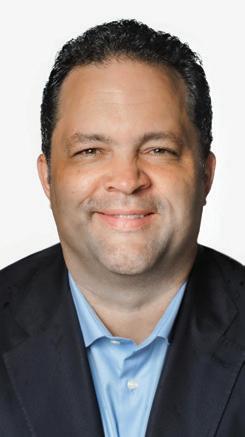
The Washington Post and other outlets are reporting the Trump administration’s
Ben Jealous
campaign to purge diversity, equity and inclusion from every corner of the federal government has spread into the heart of the National Park Service. Web pages about slavery and the Underground Railroad have been edited to downplay the brutal reality of bondage and the contributions of Black
leaders. The photo of Harriet Tubman that for years greeted visitors to an NPS page about the Underground Railroad has been deleted. A webpage about the Niagara Movement — a precursor to the NAACP founded in 1905 by W.E.B. Du Bois — was rewritten. A statement about the group’s “renewed sense of resolve in the struggle for freedom and equality” was shortened simply to a “renewed sense of resolve.”
Heroic Americans gave their lives fighting for freedom and equality. Now, the Trump administration is trying to edit those very words out of the official American story.
Some say these changes are minor. I say they are surgical. They are subtle, yes — but profoundly damaging. As one
April 22 will mark the 55th anniversary of Earth Day. The power of the 20 million voices that filled the streets on the first Earth Day led the U.S. to create the Environmental Protection Agency and pass the first generation of environmental laws addressing clean air, clean water and toxic substances.
Today, under the banner “Our Power. Our Planet,” EarthDay. org, the global organizer of Earth Day, is calling on people worldwide to join “Earth Action Day”—an effort to mobilize collective action against today’s environmental crises.

historian put it, these edits suggest racism no longer needs to be confronted in America. And that’s the point.
This is not about saving space on a government website. It is about shrinking the story of who we are as a people.
Some Park Service employees who edited the websites say they made the changes out of fear. Others were simply guessing what the administration wanted. When workers are deleting key figures and events in Black history without being told — just to stay safe in their jobs — we are in dangerous territory.
We’ve seen this before. Last month, we learned Defense Secretary Pete Hegseth’s DEI purge at the Pentagon included deleting photos and posts about the Tuskegee Airmen. That hit home. Two of my grandfather’s first cousins were Tuskegee Airmen. Those men risked everything for a country that treated them as second-class citizens — and now this administration is reluctant to give them even a photo and a caption.
They even removed a webpage about Jackie Robinson’s military service. They later said it was a “mistake.” But when you see how wide this purge has spread, it starts to look less like a mistake and more like a mission.
A recent executive order from President Trump set its sights on the Smithsonian. They are targeting the very museums created to tell the full story of our country. What does this mean for the very existence of the National Museum of African American History and Culture? Or the National Museum of the American Indian?
What happens to truth when it is inconvenient to power?
We cannot rely on oral tradition alone. Our history deserves permanence. It deserves pages and plaques and national monuments and memorials. It deserves official recognition, not redaction.
I think of my family’s own story — the parts that were buried for generations. I’m descended from the main Black leader of the Readjusters, a multiracial political movement that briefly, but very successfully, governed post-Reconstruction Virginia. They were left out of the history books for more than a century. Not because they were not important, but because they were. History is power. That’s why they are going after it. The Trump administration’s attacks are not about raceblind policy. They are about race-based erasure. They support monuments to those who fought to preserve slavery while censoring stories of resistance. That’s not colorblindness. That’s complicity. It should not have to keep being said over and over again, but we will not let them diminish our communities’ contributions or deny our place in the American story. We are still here. And like the men and women of the Niagara Movement, we renew our sense of resolve. Our resolve is real. And it is rising. The writer is the executive director of the Sierra Club and a professor of practice at the University of Pennsylvania.

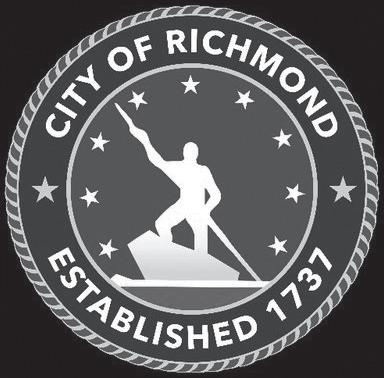
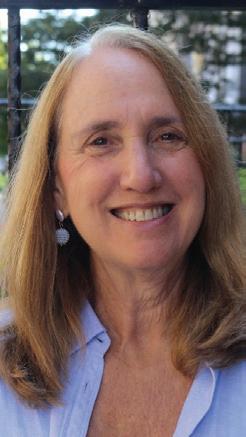
The year 2024 was disastrous for the planet. According to NASA, it was the hottest year since global recordkeeping began in 1880. In the U.S. alone, 27 climate and weather events caused at least $1 billion in damages each — second only to 2023’s 28 such events.
While multiple factors drive these disasters, research shows that human-caused climate change is worsening extreme weather, increasing drought vulnerability, lengthening wildfire seasons in the West and intensifying heavy rainfall in the East.
The plastic pollution crisis is equally dire. Earth Action reported that on Sept. 5—Plastic Overshoot Day—global plastic waste exceeded waste management capacity. In 2024, 220 million metric tons of plastic waste were expected, with 66% of people living where waste outpaces local disposal capacity. While negotiations for a strong global plastics treaty in Korea held the promise of addressing these issues, negotiators failed to reach agreement and the talks drone on.
Meanwhile, science increasingly reveals plastics’ harm to human health. The World
Wildlife Fund estimates people ingest up to 5 grams of plastic weekly and recent studies found high plastic levels in human brains. Plastics are linked to cancer, endocrine disruption and impaired development. Wildlife suffers too, from ingestion and entanglement.
For years, the plastics indus-
Susan Bass
try claimed recycling could solve the problem. Yet most plastic isn’t truly recyclable due to quality loss, contamination and non-recyclable materials. Relying on plastics also perpetuates fossil fuel dependence.
The common thread in these crises? Humanity. But the solutions also lie in our hands.
The link between greenhouse gases and climate change is undeniable. Fossil fuels drive 75% of greenhouse gas emissions and 90% of carbon dioxide emissions, per the United Nations. Yet the International Renewable Energy Agency says 90% of global electricity could—and should—come from renewables by 2050.
Transitioning to renewables isn’t just about climate. It’s also the cheapest energy option in most places, improves air quality, creates up to 30 million jobs and bolsters energy security.
Individuals can act by powering homes with renewable energy, supporting community solar or urging leaders to invest in clean energy. Consumers can choose plastic-free products,

demand businesses reduce plastic use and push governments to curb production, ban toxic additives and improve waste systems.
This Earth Action Day, exercise your power. Show leaders in government and business that we’re watching—and we’ll hold them accountable for protecting our planet and its people.
The writer is the senior vice president of Earthday.org
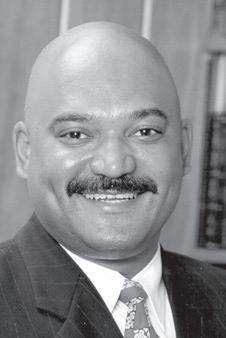

Your written or oral comments can be given at the meeting or emailed or postmarked no later than May 27th, 2025, to Mr. Thomas Westbrook, Project Manager, Department of Public Works (DPW), City of Richmond, 900 East Broad Street, 6th Floor, Richmond, VA 23219. You may also email your comments to Thomas.Westbrook@rva.gov. Please include” UPC 118541 – Broad Street over Abandoned CSX RR Spur” in the email subject line. The City of Richmond ensures nondiscrimination in all programs and activities in accordance with Title VI and
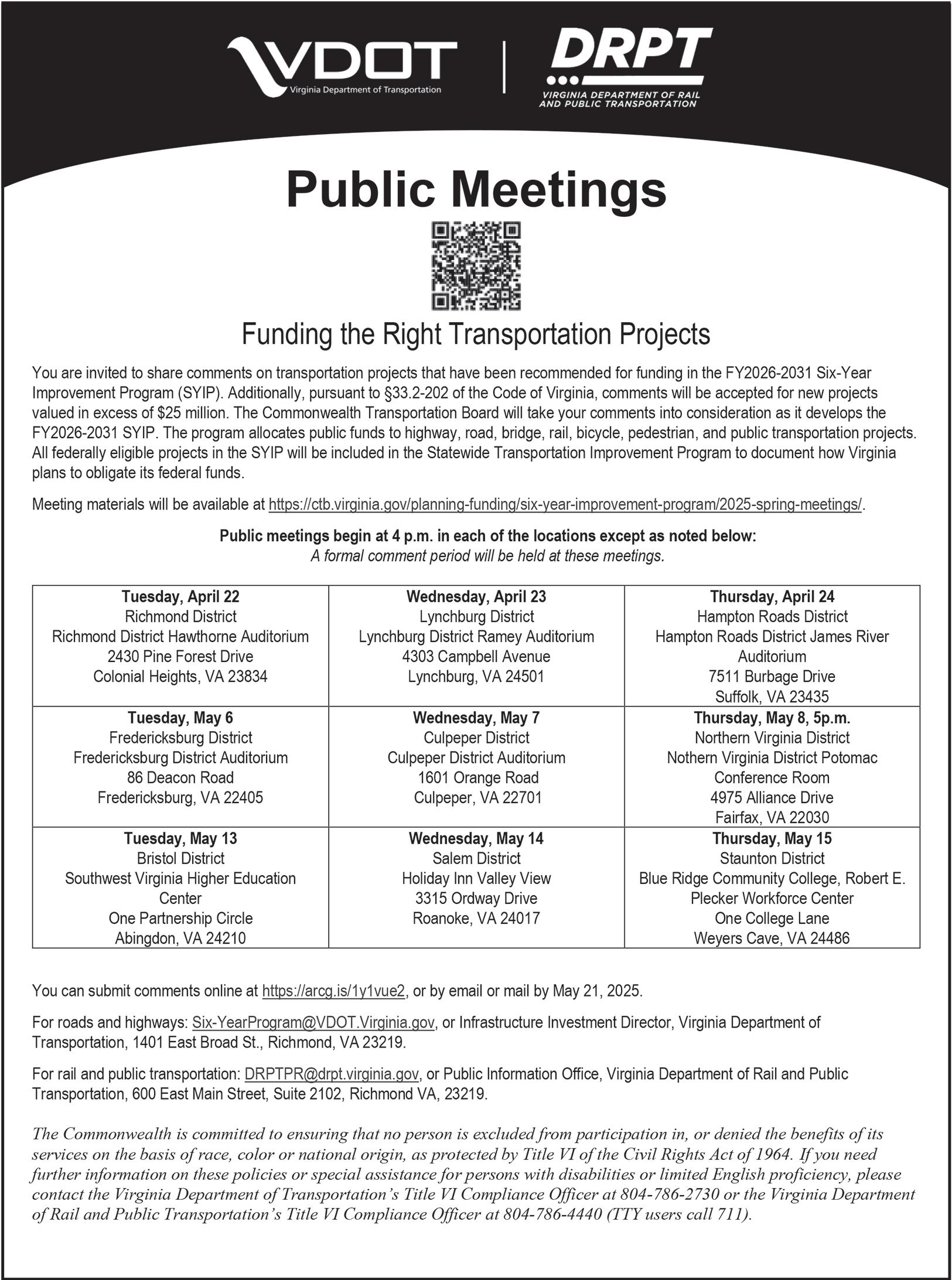
Free Press staff report
The next generation of basketball royalty arrives in Allen Iverson’s hometown May 1-3 as the Iverson Classic showcases the nation’s top high school prospects at Bethel High School’s Allen Iverson Gymnasium.
The day will be filled with fan-favorite events such as the 24K Showcase, Dunk Contest, and Three-Point Shootout. Fans can secure tickets now at IversonClassic.com/2025, but they are expected to sell out quickly.
“It’s a reflection of the culture, the game, and of everything that made me who I am,” said NBA Hall of Famer and Hampton native Allen Iverson. “Bringing it back to here — back home — means everything.”
Iverson Classic alumni such as Shai Gilgeous-Alexander, Paolo Banchero, and 3x NBA Dunk Champion Mac McClung are now shining in the NBA.
The Iverson Classic is known for its explosive competition and viral moments, earning praise from major outlets such as SLAM Magazine, which called it “the most competitive game
Squirrels drop back-and-forth game to close road trip
Victor Bericoto launched two home runs, but the Richmond Flying Squirrels fell to the Harrisburg Senators, 8-6, in a back-and-forth contest Sunday afternoon at FNB Field.
The loss sealed a tough road trip for Richmond (2-7), which dropped four of six games in the series against Harrisburg (4-5).

The Flying Squirrels jumped ahead early when Carter Howell and Diego Velasquez led off the game with consecutive singles. Two batters later, Bericoto crushed a three-run homer — his first of the season — for a 3-0 lead.
Harrisburg responded in the bottom of the first on an RBI single by Phillip Glasser, then tied it in the second on Daylen Lyle’s two-out, two-strike single that plated two runs.
Richmond regained the lead in the third on RBI singles from Justin Wishkoski and Matt Higgins, making it 5-3. But the Senators answered again in the bottom half as Carlos De La Cruz belted a two-run homer to even the score at 5-5.
Yohandy Morales put Harrisburg ahead 6-5 with a solo shot in the fifth. Bericoto tied it again in the sixth with his second homer of the day — his first multi-homer game at Double-A and the second of his career.
The Senators pulled ahead for good in the seventh on Glasser’s RBI single off reliever Braxton Roxby (0-1) and added an insurance run in the eighth. Richmond threatened in the ninth, loading the bases with one out, but Junior Santos (Save, 1) induced a game-ending double play from Wishkoski. Ivan Armstrong (1-0), a former Giants minor leaguer, earned the win for Harrisburg.
The Flying Squirrels returned home to The Diamond for a six-game series against the Chesapeake Baysox, continuing through Sunday.
of the year.” The event regularly features surprise celebrity appearances, with past guests including Tracy McGrady, Ja Morant and hip-hop artists NLE Choppa and Jadakiss.
Since its debut in 2017, the Iverson Classic has become the premier All-American game for high school basketball players, known for its unique mix of intense competition and cultural influence. The event offers players the chance to compete and train under the guidance of Allen Iverson and other NBA legends.
The main event, the Iverson Classic All-American Game, will take place on May 3 at the Hampton Coliseum.
The 2025 Iverson Classic roster includes Darryn Peterson, Nate Ament, London Jemison, Kiyan Anthony, AJ Dybantsa, Tounde Yessoufou, Shelton Henderson, Meleek Thomas, Darius Acuff Jr., Caleb Wilson, Mouhamed Sylla, Nikola Bundalo, Chris Cenac Jr., Eric Reibe, Sadiq White Jr., Alexander Lloyd, Cornelius Ingram II, Jasper Johnson, Kaden Magwood, Eli Ellis, Matthew Able, Kingston Flemings, Jake Wilkins, Cam Ward, Davis Fogle and Jamarion Batemon.
For more details, visit IversonClassic.com/2025
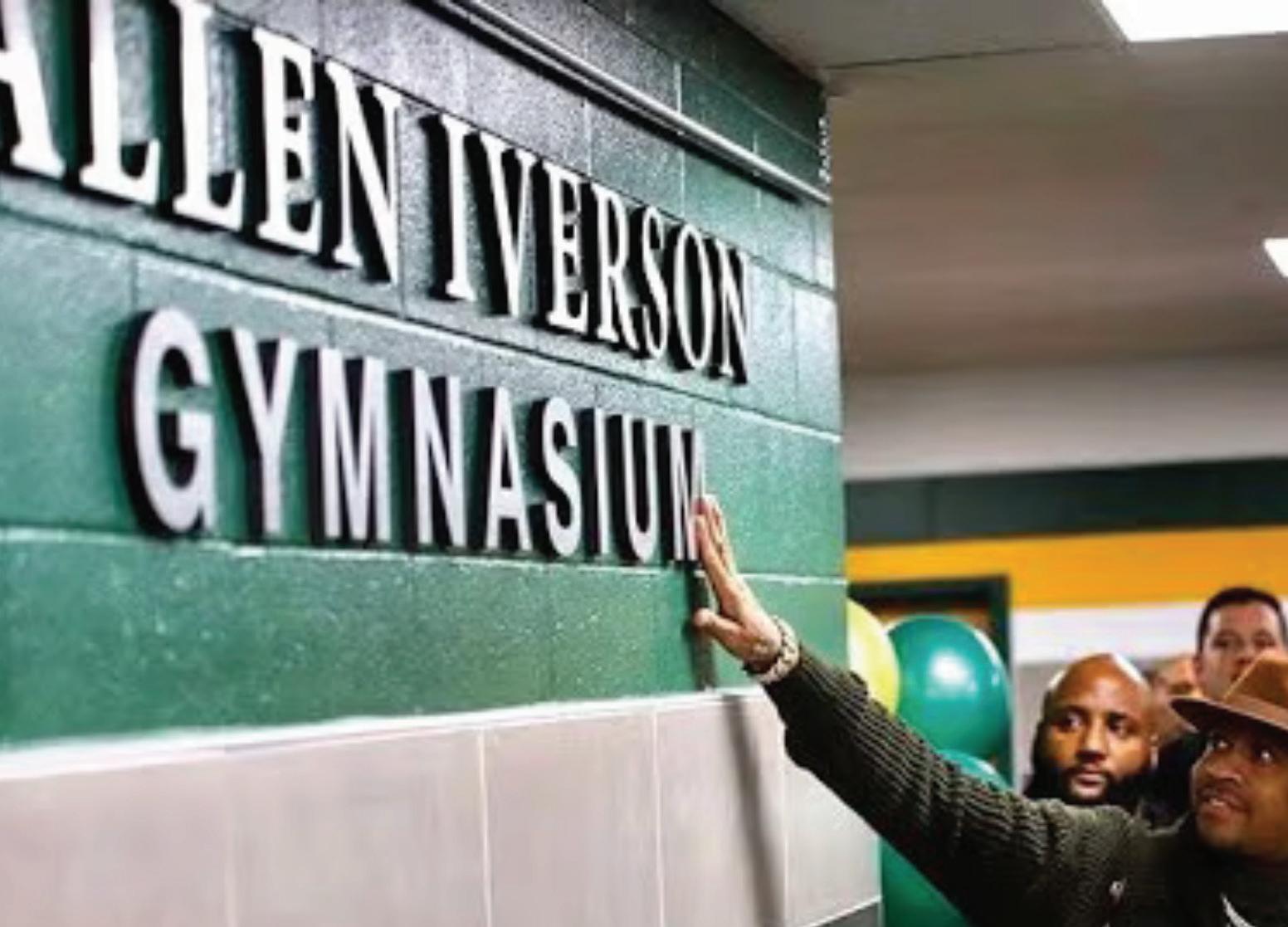
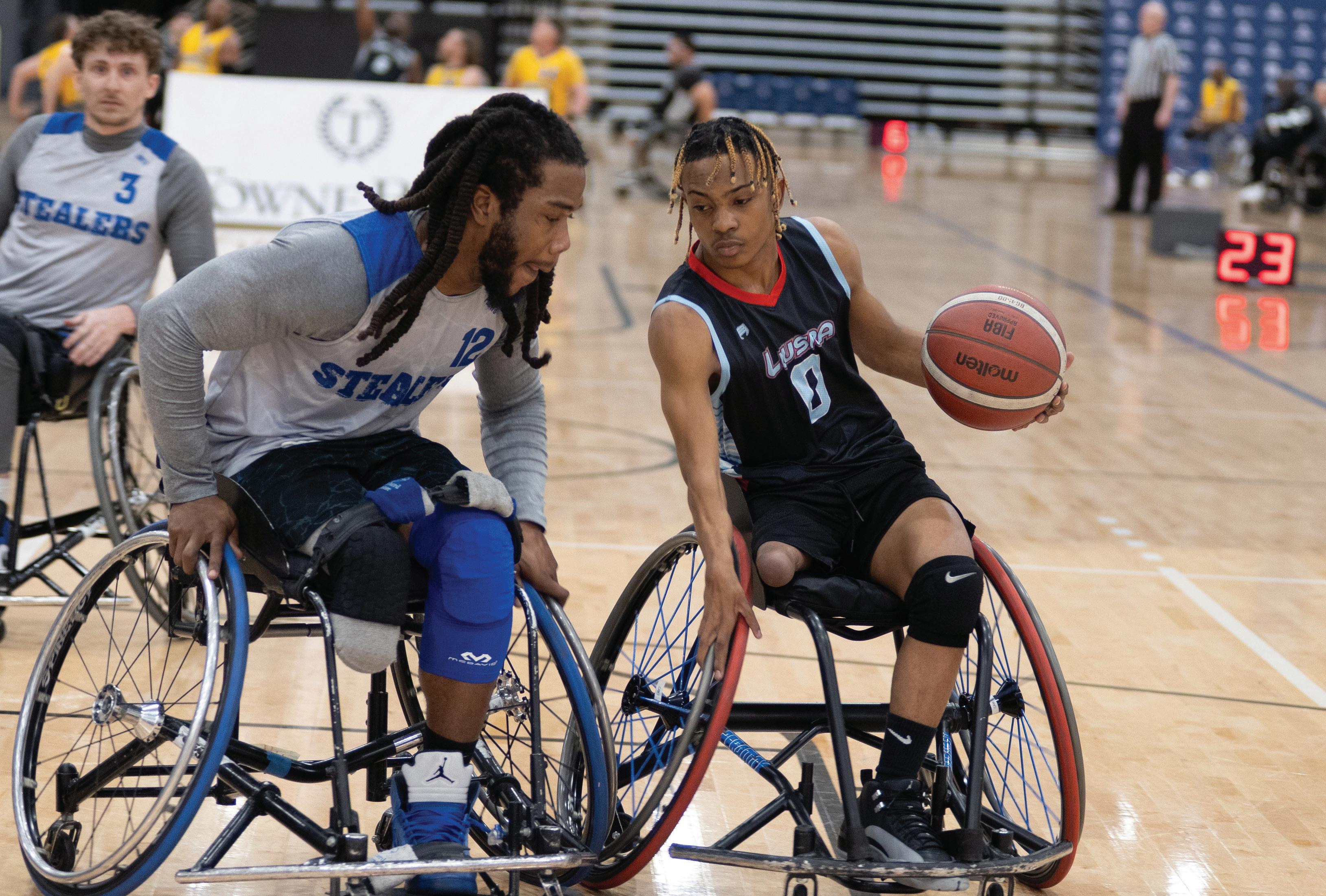
Free Press staff report
Winston-Salem State Uni-
versity made history Saturday by winning the Central Intercollegiate Athletic Association’s
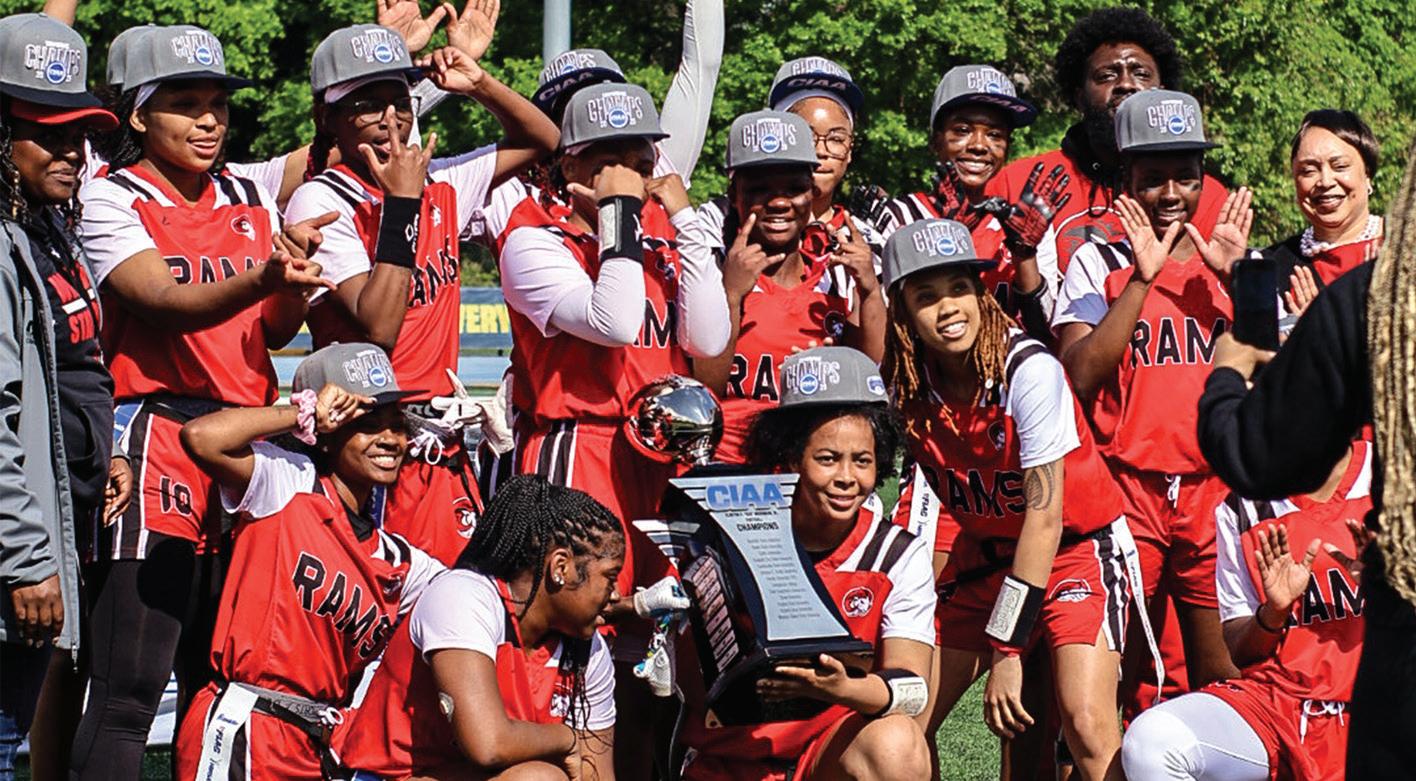
Free Press staff report
Pickleball takes center stage next month as the first Pickleball Festival comes to Regency Mall on Saturday, May 3, offering a full day of competition, community and fun. Set in the parking lots outside Performance Pickleball, the event will feature both indoor and outdoor activities for players of all skill levels. From casual matches and round robins to beginner lessons, the festival will showcase the fast-growing sport while welcoming newcomers.
The day also will include live music from the band Sidepiece and DJ Tony, food trucks and a marketplace with pickleball gear, apparel and handmade goods.
The festival runs from noon to 4 p.m., with VIP early entry beginning at 11 a.m. An after-party will follow at Twin Hickory Tavern. Hosted by R&D Events + Marketing in collaboration with Performance Pickleball, tickets and details

Christine DeFilippo’s journey with multiple sclerosis (MS) began while she was on vacation in 2017. She first noticed a tingling sensation in her legs, followed by waves of hot and cold. Soon after, her legs felt like Jell-O, and she eventually woke up unable to walk. Doctors initially diagnosed her with transverse myelitis, but uncertain about the accuracy of that diagnosis, she sought a second opinion from a neurologist at Johns Hopkins Hospital.
Diagnosing MS can often take years, but advancements in medical technology, updated diagnostic criteria, and the use of blood-based biomarkers have led to greater accuracy. After undergoing multiple rounds of testing and a long period of uncertainty, DeFilippo finally received the correct diagnosis. Within eight months of experiencing her first symptoms, she was able to begin disease-modifying therapies designed to reduce relapses and slow the progression of the disease.
The National MS Society estimates more than 2.8 million people are living with MS globally, while the disease afflicts almost 1 million in the U.S. However, thanks to the more than 50,000 people participating in the annual MS Walks and Bike Rides across North America, the organization raises millions of dollars to support those afflicted with the disease. This collective effort has funded research and provided patient support and advocacy for policy that improves access to treatment and care.
DeFilippo was fortunate to receive a diagnosis within a year of her initial symptoms — a relatively short timeline for MS. Still, the experience was frightening for both her and her family.
“Anytime you have a medical situation that is progressive with no cure, it’s a hard thing to rationalize,” DeFilippo said. “It’s emotional.”
Diagnosed with relapsing-re
on the trustee and co-chair of the National MS Society for Richmond Council VA/WV Chapter
mitting MS — the most common form of the disease, marked by flare-ups followed by periods of remission when symptoms may fade — DeFilippo is grateful she can still enjoy the activities she loves.
“I’m lucky because I don’t have a significant number of lesions,” she said. “I haven’t had new disease symptoms.”
Since leaving her corporate job two years ago, she has focused on growing her coaching and consulting business while also dedicating time to raising funds and awareness for the National MS Society.
Because MS is a progressive and unpredictable disease, DeFilippo makes it a priority to do as much as she can each day, knowing there’s no way to predict when or how the condition might advance.
Meet the former corporate executive turned MS advocate who’s grateful for the time she now dedicates to raising awareness and supporting the MS community—this week’s Personality, Christine DeFilippo:
Place of birth: Pittsburgh. Where I live now: The West End.
Education: Carnegie Mellon with a degree in industrial management.
Family: Husband, Joe, two daughters and an Aussiedoodle who keeps me walking!
What is Multiple Sclerosis
(MS): It’s a neurological disease and an auto-immune disease that can lead to a wide range of symptoms. It causes the immune system to mistakenly attack the protective covering of nerves, creating lesions. It can impact vision and physical capabilities from the lesions that form on
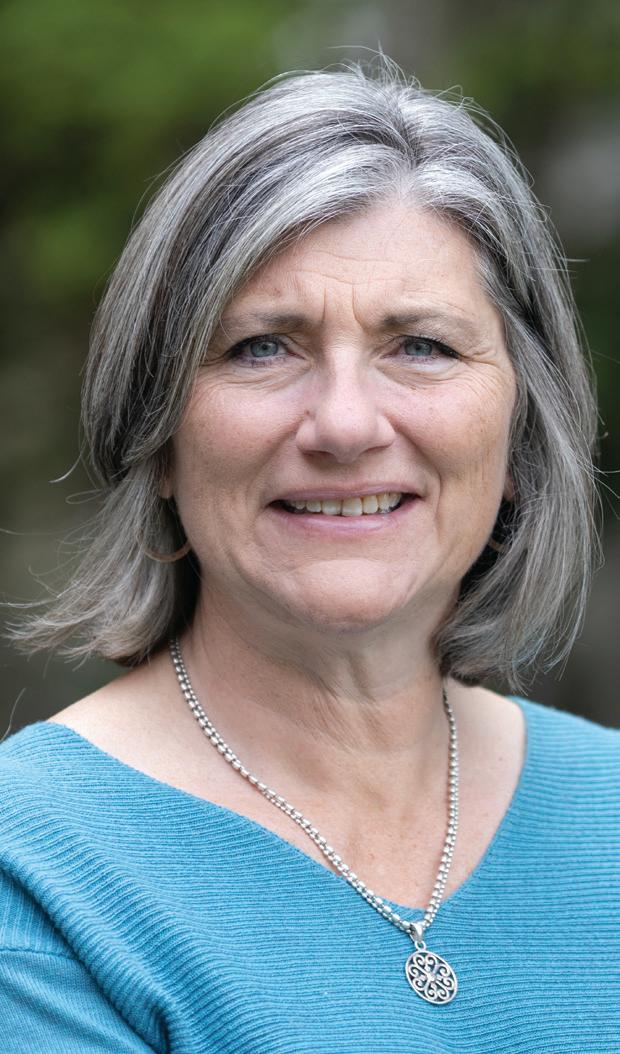
the spine and the brain. There are a few different types of MS, with the most common and most treatable being Relapsing Remitting MS (RRMS). RRMS is characterized by new or worsening symptoms (relapses) followed by periods of recovery or remission. Symptoms of a relapse vary from person to person but include things like vision problems, fatigue and mobility issues. Who’s at risk for MS: MS can impact anyone, but is most commonly diagnosed between the ages of 20 and 50. Women are more likely than men to be diagnosed.
How is MS diagnosed: MS is diagnosed through a series of tests — bloodwork, MRI’s of the brain and spine and often a spinal tap to see if the markers are present that indicate MS.
MS Treatment options: Cur
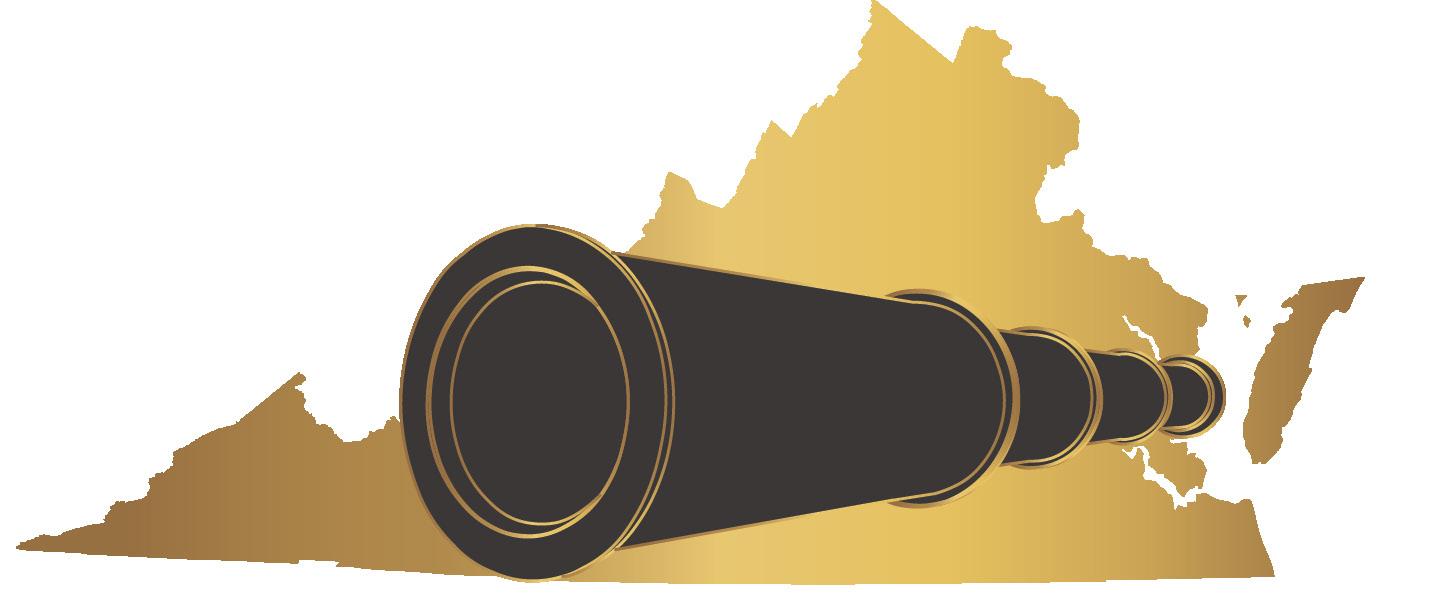
rently, there is no cure for MS. However, there are a number of disease-modifying therapies (DMTs) that can treat MS. These work in various ways to keep the immune system from attacking the nerve fibers. There are more DMTs available for RRMS, and research has contributed to new and different treatments each year.
The National Multiple Sclerosis Society is: NMSS is a non-profit organization dedicated to ending the effects of MS through research, advocacy and services for people affected by the disease. They fund research and advocate for social and political change. They also have comprehensive educational and support resources for people living with MS and their families. Mission: To cure MS and empower people affected by it to live their best lives.
NMSS Founder: Sylvia Lawry, who sought a cure for her brother. When was NMSS/Richmond Council founded: The Richmond Council was founded a few years ago. We aim to help raise awareness and advocacy for the NMSS in Richmond. Having a local council helps extend the reach of the broader VA/WV Chapter of the NMSS. The council strategy is used by the society to create a more localized opportunity to do our work. When and why I got involved: I started attending Walk MS in 2014 to support a colleague who lived with MS. After my diagnosis in 2017, I formed an MS Walk team and became
to make a difference for those living with the disease. I feel like I’m guiding my future in a way. I’m not someone to sit on the sidelines when I can do something and make an impact. That’s what led me to taking on broader volunteer positions with the society.
No. 1 goal as a board trustee and co-chair of the NMSS/ Richmond Council: To continue to grow the council. As we expand, we expand the reach of the organization, which is essential to continue to drive the mission of the organization in the area. As co-chair for community engagement on the board of trustees, my goal is to expand the reach of councils. We have a couple of very active councils, but a top goal is to create a new council in our footprint across VA/WV.
Strategy to achieve goal: To continue to build our presence and awareness of the opportunity to engage with the council.
Biggest challenge: It’s hard to find the right connections with people who live with MS or have a passion for getting involved with the NMSS. We continue to strive to find passionate people who can help drive advocacy and support for the organization in local communities.
Upcoming events and details: The MS Walk Richmond is Saturday, May 3, at the National MS Society Richmond Office, 4200 Innslake Drive in Glen Allen at 10 a.m. The MS Bike also is coming up on May 31 – June 1. Join the Bike MS: Colonial Crossroads Facebook page for more details. Details can be found on: events.nationalmssociety.org How I start the day: I start and end each day with gratitude.
I didn’t wake up with the dog staring me down, ready to go out! But the habit is a good one and really helps you find things to be grateful for, even on the hardest days.
Three words that best describe me: Investigative, enterprising and motivated.
Top three on my music playlist: Chappell Roan, Taylor Swift and Broadway musicals.
Something I love to do that most people would never imagine: I’m an avid baker. I like to take an ingredient and then challenge myself by finding recipes that have that ingredient and making things that I’ve never tried before.
Inspirational quote: “We cannot change the cards we are dealt, just how we play the hand.” — Randy Pausch.
Most influential person: My father. We lost him while I was in college, but he really shaped who I am today. Throughout my life, I’ve often thought about how he’d handle a situation and used that to guide my actions. He was a creative, intelligent, interesting and kind man.
Most influential book: Randy Pausch’s “The Last Lecture.”It was written by a professor at Carnegie Mellon who was diagnosed with terminal pancreatic cancer. He provides some key insights into how to live your best life.
What I’m reading now: I just finished “Broken Country,” by Clare Leslie Hall. For me, one of the big takeaways is that the past is the past for a reason. Decisions you’ve made in the past shape the future, but you can’t dwell on or rethink (or relive) the past. Next goal: I want to finalize my growth strategy and develop a broader client base for my new business. I also aim to meet my fundraising goal for MS Walk this year!

Mann, President and CEO, Campagna Center
Grace E. Harris Leadership Award Eva Teig Hardy
Hill-Robinson Expansion of Freedom Award
Reverend Tyler C. Millner, Sr.
Innovation in Government Award
Robert David Sr., Violence Prevention Manager, City of Danville
Unsung Heroes Award


Mark Greenough, Virginia Capitol Building Tour Supervisor


Free Press staff report
Ashland Train Day returns to Downtown Ashland on Saturday, April 26, offering a day of family-friendly fun, food and entertainment from 11 a.m. to 4 p.m.
The free annual event, organized by the Ashland Main Street Association, celebrates the town’s railroading roots with a variety of trainthemed attractions, music, shopping, dining and other activities.
More than 100 vendors will be on hand selling handmade goods, jewelry, art and treats. Food options will include sit-down meals at several local favorites. Train Day also highlights local shops throughout downtown Ashland. Visitors can browse specialty items at various stores, while the Ashland Feed Store hosts a petting zoo and the Friends of the Library hold a children’s book sale at the
Ashland Branch Library.
Free Press staff report
Two exhibitions are showcasing the dynamic work of emerging artists in the area. The VCUarts MFA Thesis Exhibition at the Institute for Contemporary Art (ICA) and Virginia State University’s (VSU) “Seeing Red” at the Petersburg Area Art League (PAAL) are offering a platform for students to present their researchdriven, socially engaged work.
The VCUarts MFA Thesis Exhibition, open through May 11, brings
Live music includes performances by the Hanover Concert Band, Center Street Sound Co. and Free Jambalaya at the Hanover Arts and Activities Center. The Ashland Theatre will show train-themed and classic movies.
For rail fans, model train displays will include vintage locomotives, lego setups and a restored 1926 Chesapeake & Ohio red caboose. The Ashland Museum will be open to explore the town’s history and legacy. Children can take part in a scavenger hunt, enjoy inflatables and games in the Kid Zone and ride the Kiddie Train. For adults, the Ashland Haunted History Tours will offer guided ghost walks through the town.
For those unable to attend in person, Virtual Railfan will stream live footage of Ashland’s busy train corridor at virtualrailfan.com. For more information, visit ashlandtrainday.com.
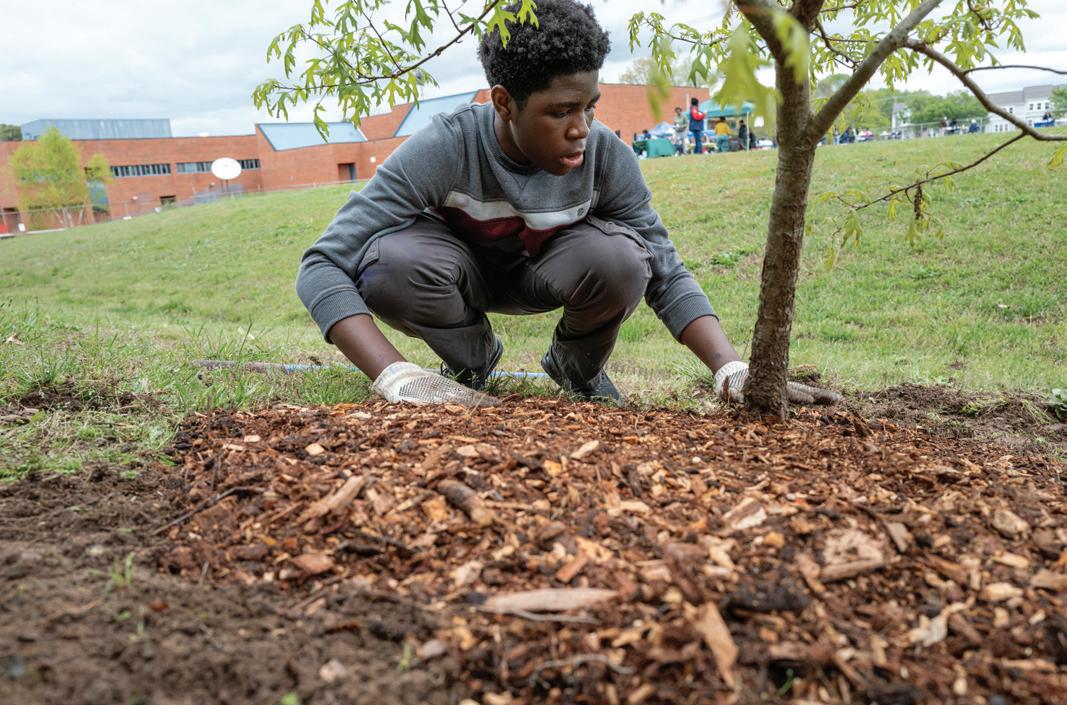
in 2020. Below, Richmond’s first Moon Tree, grown from seeds that orbited Earth and the moon during NASA’s Artemis I mission, was planted at Thomas C. Boushall Middle School through a partnership with the U.S. Forest Service and NASA. The project honors the legacy of the Apollo 14 mission. Right, six-year-old Titus Vaughn slides down from the Lit Limo after picking out a book as student Andie Butler looks on.
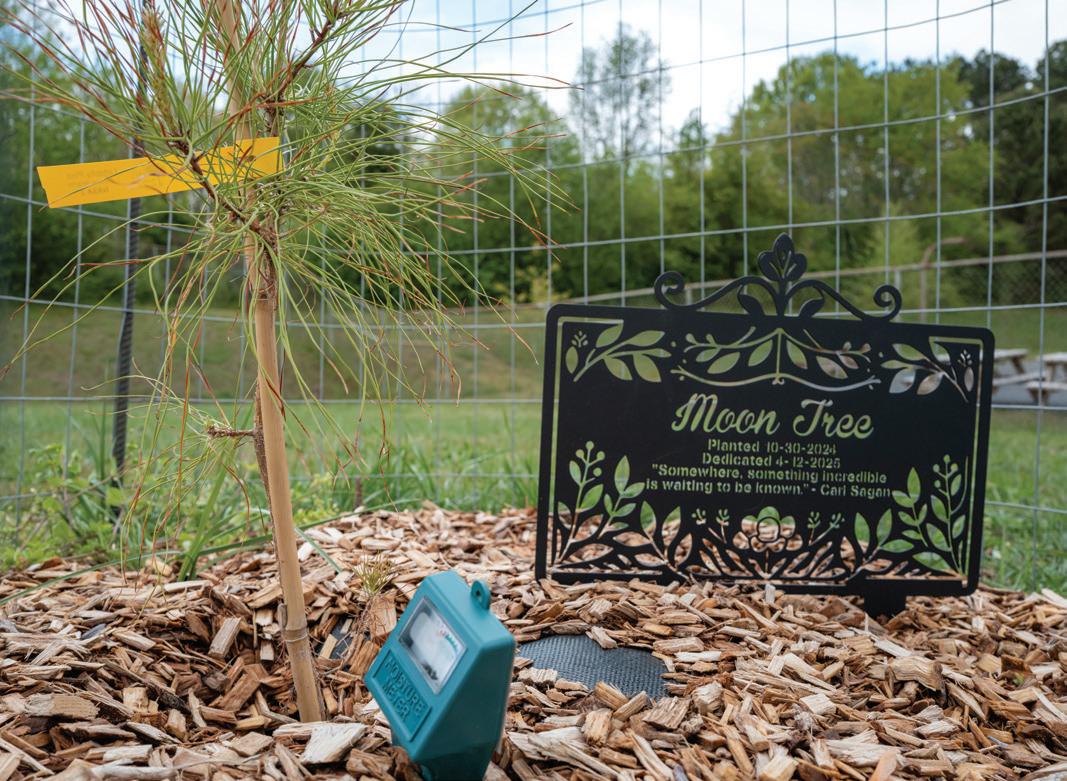

Richmond’s first Moon Tree was dedicated at Thomas C. Boushall Middle School through a partnership between the U.S. Forest Service, NASA, and the school. The tree’s seeds orbited Earth and the Moon during NASA’s Artemis I Mission, honoring the legacy of the Apollo 14 Mission. The dedication event featured interactive stations hosted by the U.S. Department of Forestry, the University of Richmond, Richmond Public Library and the Virginia War Museum. Thomas C. Boushall eighth graders also participated in a service project organized by South Side ReLeaf.

together 26 graduate candidates from a variety of disciplines, including Craft/Material Studies, Graphic Design, Kinetic Imaging, Painting and Printmaking, Photography and Film, and Sculpture and Extended Media.
This year marks the first time the exhibition is being held at the ICA, allowing for broader visibility of the students’ works. Additional pieces are on display at the Anderson Gallery, continuing a decades-long tradition of showcasing emerging talent from VCUarts.
Across the river, “Seeing Red” at Petersburg Area Art League continues through May 4, offering a thoughtprovoking collection of works from VSU’s graduating seniors. The exhibition delves into themes of social justice, cultural identity and historical trauma, reflecting the emotions and conversations shaping today’s world.
Both exhibitions provide a glimpse into the future of contemporary art, as these young artists explore the intersection of personal expression and larger social issues.

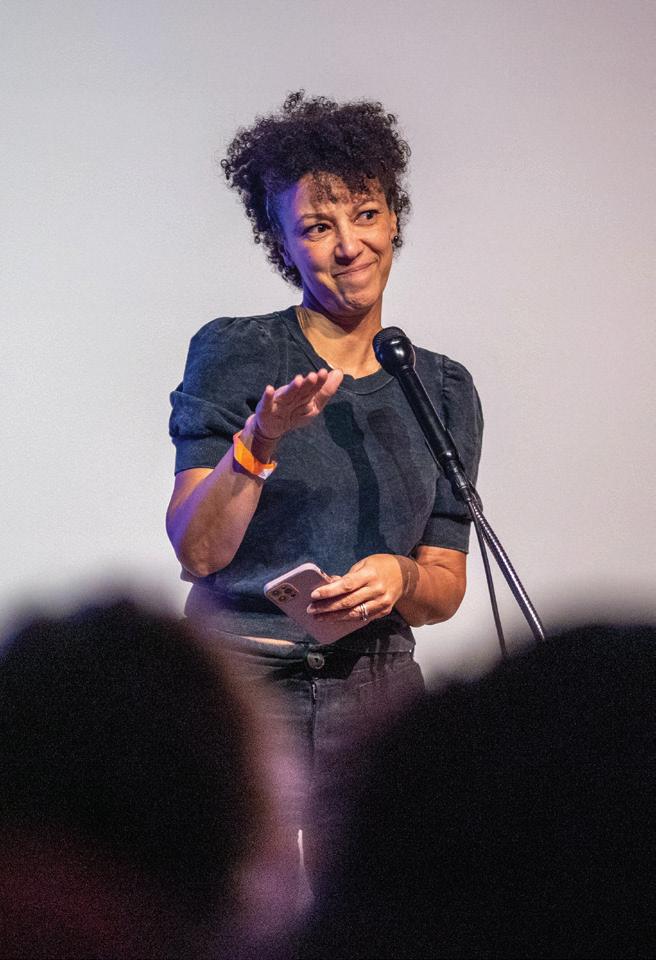

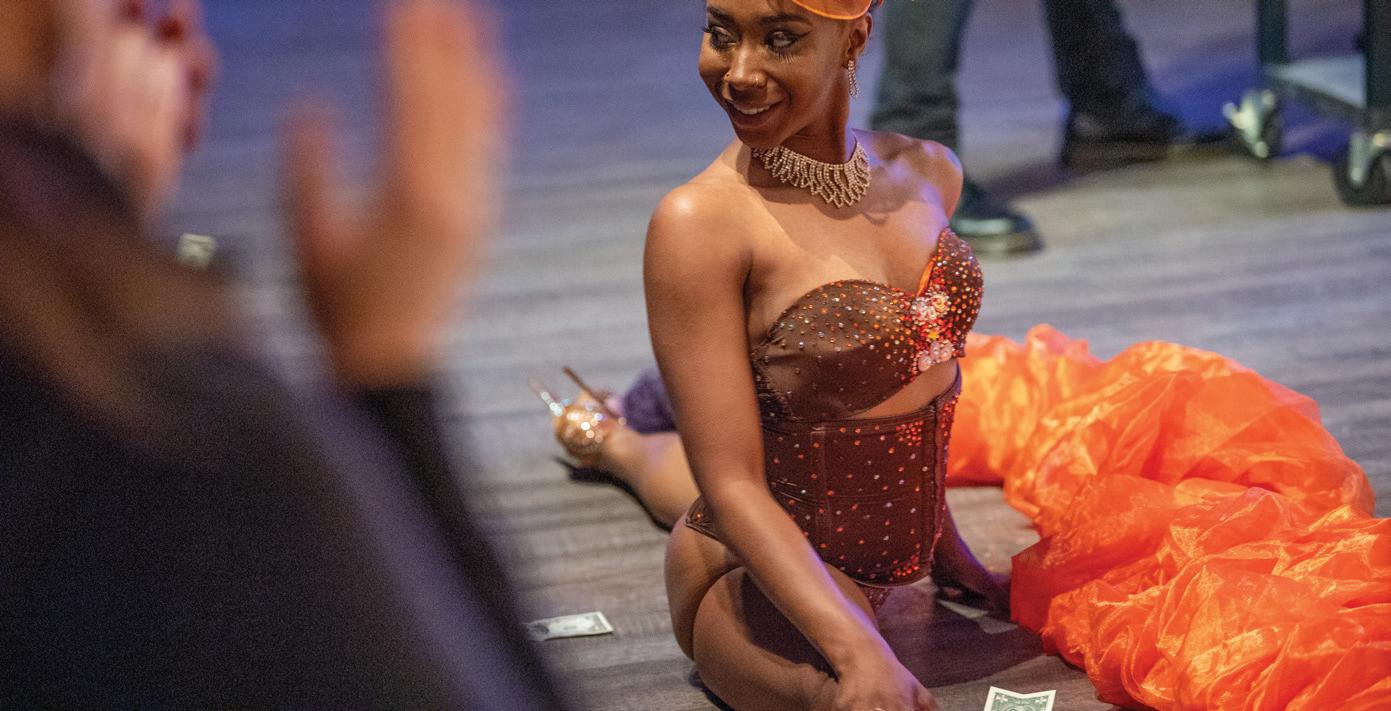

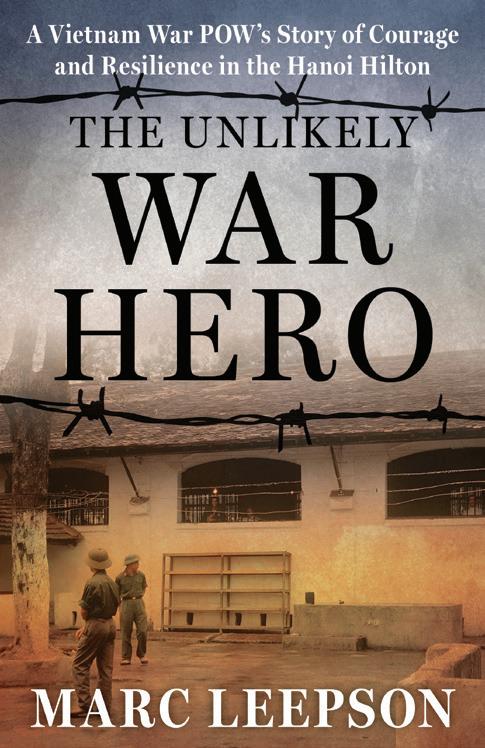
Free Press staff report
The 32nd Annual Christian Leadership Prayer Breakfast is set for Thursday, May 1, bringing together more than 300 Christian leaders from across the Richmond area for worship, fellowship and reflection.
Held in observance of the National Day of Prayer, the breakfast will take place from 7 to 9 a.m., with doors opening at 6:45 a.m. The event will be held at The Commons, formerly known as U-Turn, located at 2101 Maywill St. A hot breakfast catered by A Sharper Palate will be served.
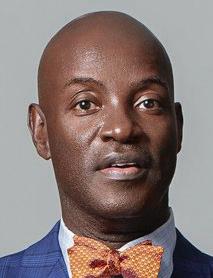
The event is hosted by For Richmond, a nonprofit organization that “connects and equips Christian leaders to collaborate for the transformation of Metro Richmond,”
according to its website.
This year’s program will include worship, prayer segments led by local leaders addressing needs in the community and a time for quiet reflection. Worship leaders include Brooke Wright of Third Church and Makeda McCreary of Spring Creek Baptist Church.
Speakers and prayer leaders include Corey Widmer of Third Church, Ben Campbell of St. Paul’s Episcopal Church, Lee Mitchell of New Life Baptist Church and Bishop Daniel Robertson Jr. of Mt. Gilead Full Gospel International Ministries, among others. Registration is required. No on-site registration will be available. For more information or to register, visit forrichmond.org.
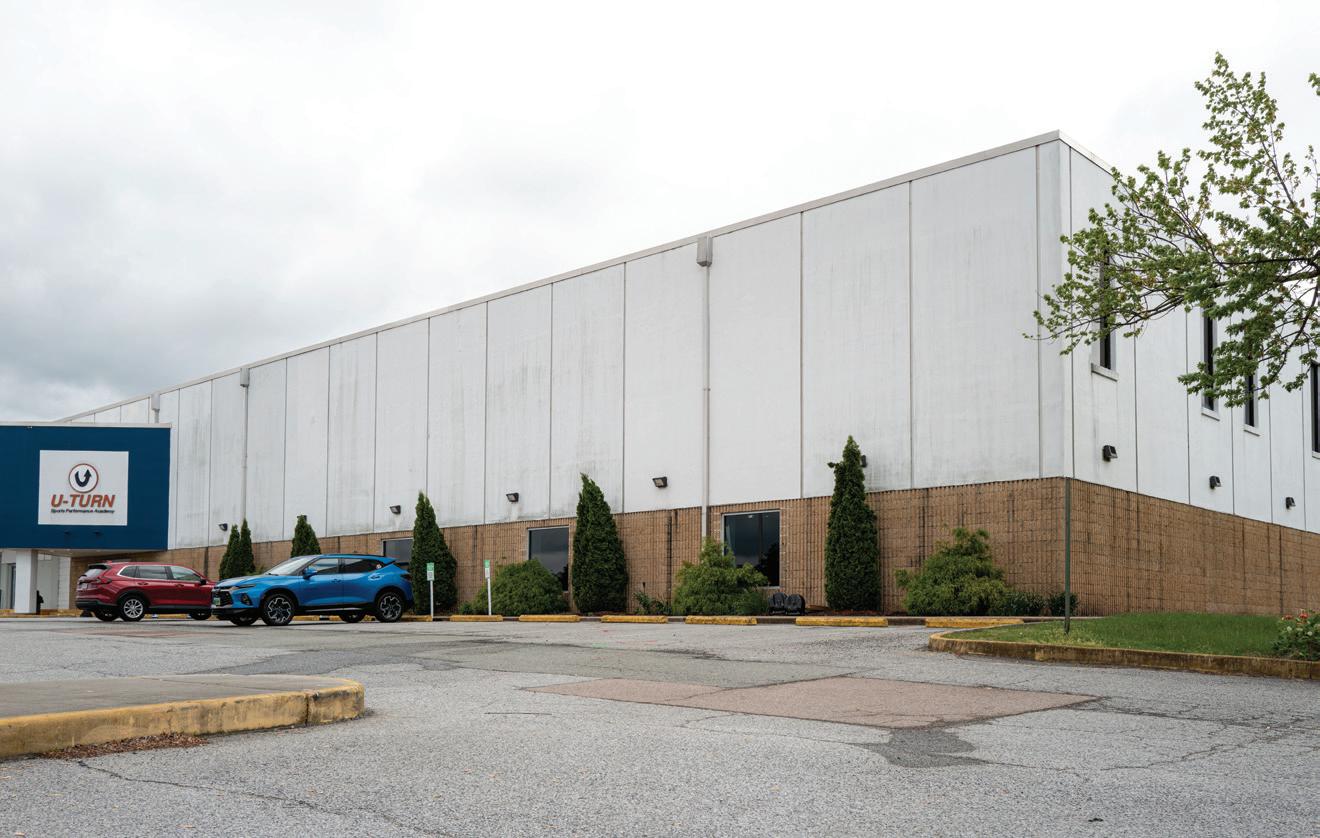
Free
Dr. Sylvester T. Smith, pastor of Good Shepherd Baptist Church and a professor at Virginia Union University, will host a book signing Saturday, April 19, at the church, 1127 N. 28th St., beginning at noon.
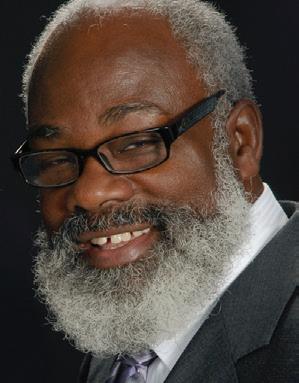
The event celebrates the release of Smith’s new book, “Ellison Jones Convocation Lectures,” as well as his 75th birthday.
Smith’s latest publication brings together two lectures he delivered at the Samuel DeWitt Proctor School of Theology at Virginia Union University,
where he serves as an assistant professor of ethics and interdisciplinary studies. The book, part of the series “Lectures by Dr. Sylvester T. Smith,” addresses the urgent need for justice, love and liberation in the world through the lens of prophetic preaching. The first lecture, “Preaching Power: Preaching Love & Justice,” was delivered during the 2016 Ellison Jones Convocation and explores biblical mandates for justice drawn from scriptures such as Micah 6:8, Isaiah 61:1-2 and Amos 5:24. The second lecture, “Preaching & Social Justice:
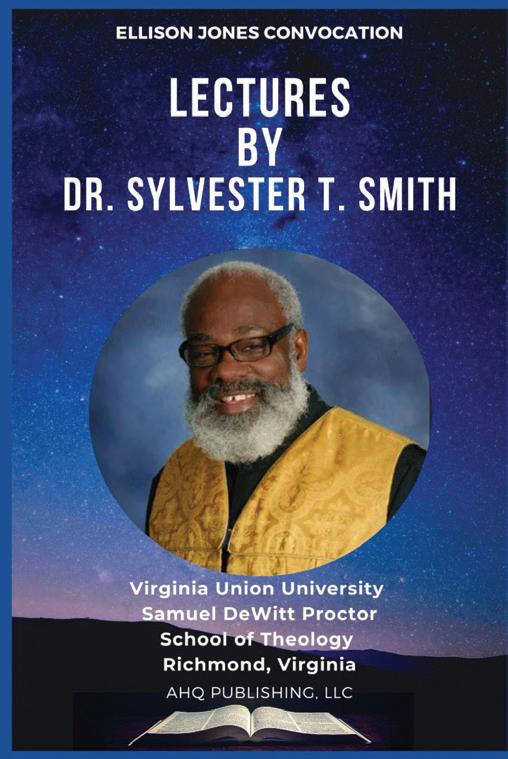
Preaching Liberation in Perilous Times,” was presented at the 2023 convocation and focuses on the moral challenges facing contemporary society and the
need for bold, justice-oriented preaching.
In addition to his pastoral and academic roles, Smith is a leader in numerous civic and religious organizations. He serves on the boards of the Baptist General Convention of Virginia, the Better Housing Coalition, Richmond Affordable Housing and Armstrong Priorities.
For more information about the event, contact Good Shepherd Baptist Church at (804) 644-1402.

We sincerely thank you for your kindness, support and comforting words at our

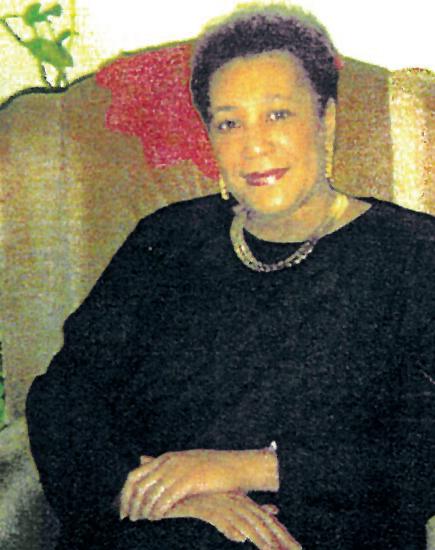
of
Your cards and flowers were so thoughtful during this difficult time, and we are grateful for your expression of sympathy and love, it means more than we can say.
